A GUIDE TO OAKWOOD SECONDARY CAMPUS



We hope this booklet is helpful in answering some of the questions that you might have about Oakwood’s curriculum and programs in our middle and high school.
Oakwood School fosters and supports our students’ acquisition of 21st century skills and intentionally cultivates expertise, creative thinking, and selfmotivation. The resulting school culture brings joy to the pursuit of learning and enables each student to distinguish themself.
The Oakwood School core curriculum is both innovative and challenging— and foundational to a student’s experience of the school. We are mindful and deliberate around each course offering and content decision. And while our curriculum is key, our approach to teaching is everything because fostering a student’s ability to take charge of their own intellectual pursuits—who they become—will sustain them for life.
In addition, the learning experience is enriched by compelling electives and cocurricular activities—Immersion, Independent Studies, Advisory, Community Engagement, Athletics, Clubs, etc.—where students get to explore and connect their academic work to real world stories, needs, and problems.
This interplay allows Oakwood secondary campus students the opportunity to engage with the world outside of school walls, expanding their perspectives and empowering them to take what they know and do something with it.
The focus on useful, applied knowledge is at the heart of our constructivist approach to education versus more traditional methods that often rely upon rote learning and teaching to a test. The ability of an Oakwood student to apply and further their own learning becomes an essential part of their identity that will distinguish and serve them for life.
It’s the hallmark of an Oakwood education.
If you’d like to take a closer look at detailed descriptions of the courses you see referenced in this guide, please find our full curriculum guide at oakwoodschool.org/secondary.

STATEMENT OF PHILOSOPHY
OAKWOOD SECONDARY CAMPUS AT A GLANCE
RECENT HIGHLIGHTS
CAMPUS MAP
ACADEMIC REQUIREMENTS, POLICIES & PROCEDURES
SECONDARY CAMPUS SCHEDULE
EXPERIENTIAL LEARNING
DIVERSITY, EQUITY, INCLUSION & BELONGING
COURSE OFFERINGS BY DEPARTMENT
HUMANITIES DEPARTMENT
ENGLISH DEPARTMENT
COMPUTER SCIENCE
MATHEMATICS DEPARTMENT
SCIENCE DEPARTMENT
SOCIAL STUDIES DEPARTMENT
STEAM (SCIENCE, TECHNOLOGY, ENGINEERING, ARTS AND MATHEMATICS)
WORLD LANGUAGE DEPARTMENT
FRENCH
MANDARIN CHINESE
SPANISH
PERFORMING ARTS DEPARTMENT
DANCE
MUSIC
THEATRE ARTS
VISUAL ARTS DEPARTMENT
CERAMICS
DESIGN
DRAWING/PAINTING
FILM AND VIDEO
PHOTOGRAPHY
SCULPTURE
INDEPENDENT STUDIES/SPECIAL TOPICS
ATHLETICS
PHYSICAL EDUCATION DEPARTMENT
MIDDLE SCHOOL CALARTS PROGRAM & ENRICHMENT
CO- AND EXTRACURRICULAR ACTIVITIES
INTEGRATED TECHNOLOGY
THE OAKWOOD GRADUATE
TRANSPORTATION
OAKWOOD SCHOOL WAS FOUNDED IN 1951
by parents who wanted to provide their children with an educational experience that was rich in the arts, sciences, and humanities and challenging to their creative, intellectual, and physical capacities. They wanted a learning community that would foster independence of thought, intellectual integrity, and sensitivity to the needs of others, and prepare students for participation in a democratic society.
Oakwood remains committed to the founders’ goals. We believe that a school environment should foster individual growth and an active communal life, should hold intellectual attainment in high regard, and should encourage young people to exercise increasing autonomy and responsibility–for one another, for the environment, and for the larger world.
We believe that school best prepares children for the future by focusing on the quality of their experiences in the present. We believe that teachers and learners should inspire one another, and that school must be rewarding in its own right. And we believe that young people’s feelings and thoughts should be accorded respect and dignity.
WE INTEND AN OAKWOOD EDUCATION:
to guide students toward mastery in their academic, artistic, and athletic pursuits. We want students to grapple meaningfully with ideas, to discover relationships among disciplines, and to become independent and moral thinkers.
to spark passion. We want young people to become wholeheartedly immersed in their work. We believe that intelligence and imagination enrich each other, and that to involve a student passionately in learning is to involve the whole person.
to cultivate depth of character. We seek to nurture students’ empathy, imagination, and moral courage; to foster a sense of responsibility and humility, along with a habit of service; and to instill a lifelong commitment to social justice. We intend for the development of their intellect and character to be intertwined, so that their choices are guided by internal controls and sensitivity to the needs of others.
to help students gain self-knowledge. We want students to learn about their strengths and needs as learners. We seek to accommodate and appreciate the unique qualities of each young person and to provide multiple opportunities for students to succeed, to learn from mistakes, and to take risks for the sake of learning.
to foster a sense of community. We seek to create a vibrant public life in the school, where students learn to express themselves fluently and responsibly, and to consider differing perspectives respectfully. We believe that an environment most conducive to learning and growth is diverse and inclusive, and balances seriousness of purpose with a sense of play.
Finally, we recognize that the school can best achieve its aims when students’ experiences are predominantly positive and joyful, and where their relationships with teachers, and with one another are caring and trusting.
More than a statement of intent, our philosophy helps generate the richness, warmth, and vitality of day-to-day life at Oakwood, and the respect Oakwood has for its students. We consider childhood precious, and we take young people seriously. We believe that their feelings and thoughts should be accorded the dignity they warrant.
Adopted by the Board of Trustees, November 2, 2016
SCHOOL HOURS:
8:45am–3:30pm M/W/F
8:45am–2:40pm T/Th
The library is open daily 8:00am-6:00pm
FOUNDING DATES:
elementary campus 1951 | secondary campus 1964
CAMPUSES:
Oakwood School is located on two campuses a mile apart. The elementary (K–6) campus is located on Moorpark Avenue. The secondary campus, located on Magnolia Blvd., comprises our middle school (grades 7–8) and our high school (grades 9–12).
While the secondary campus includes grades 7–12, the middle school students occupy an important space on the campus. They are the beneficiaries of incredible mentorships, and we intentionally carve spaces specifically designed for middle schoolers. Through elements like small classes, regular advisory, a structured school day, no cellphones, a separate lunch period, and a middle school student council, our youngest students are inspired to share their voices with the community.
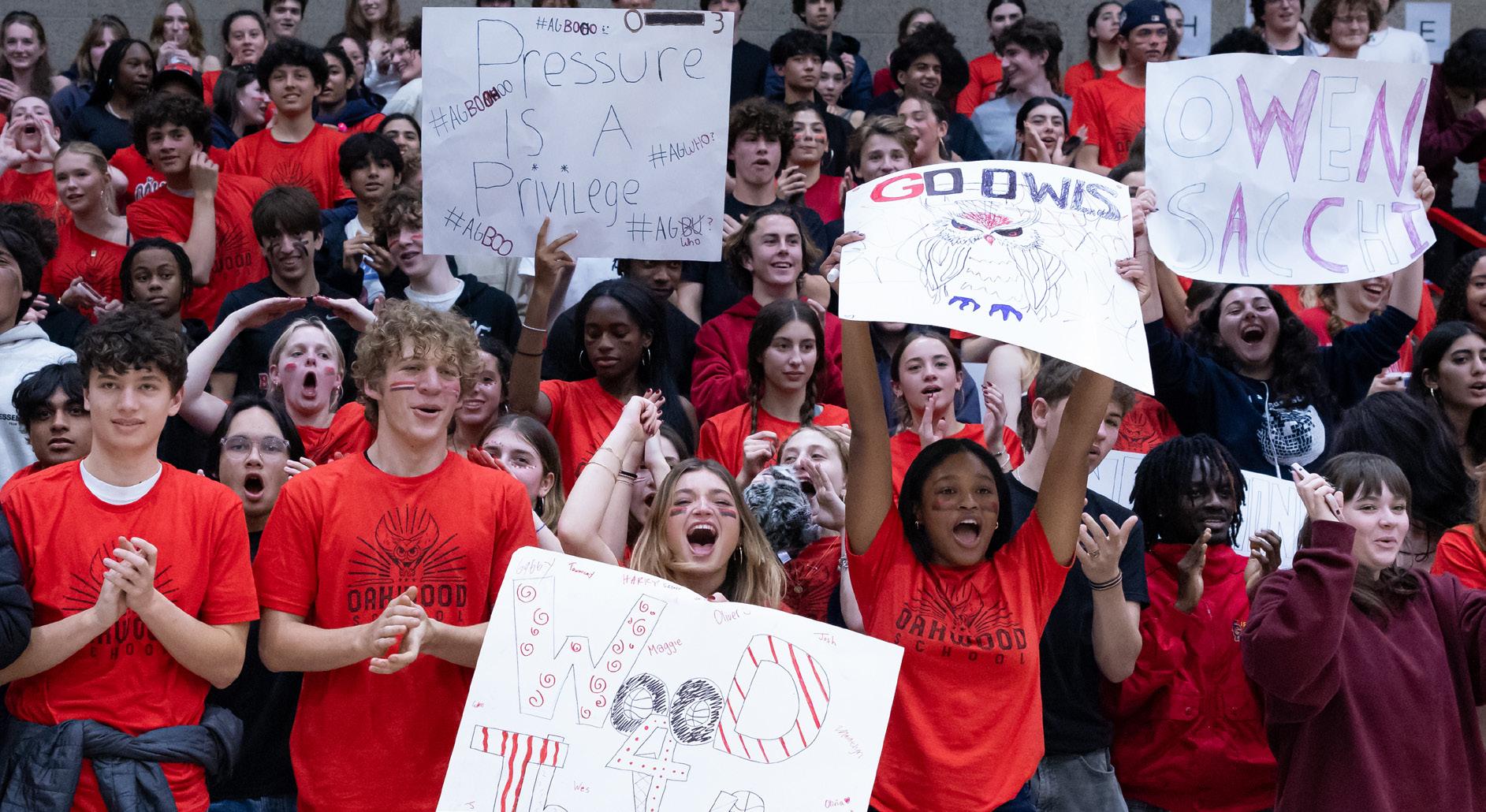
Head of School:
Jaime A. Dominguez
Assistant Head of School for Community Engagement and Belonging:
John Gentile
Assistant Head of School for Institutional Programs and Initiatives:
Miriam Singer
Teaching Faculty: 61 faculty members and 24 part-time Artists-in-Residence from California Institute of the Arts
Faculty/Staff of Color: 41%
Average Faculty Tenure: 11 years
Faculty/Admin with Advanced Degrees: 68%
BODY, GRADES 7–12:
Total Enrollment: 520 students
Students of Color: 50%
Students Per Grade, 7–8: approx. 80
Students Per Grade, 9–12: approx. 90
Average MS Class Size: 15 students
Average HS Class Size: 18 students
Average Financial Assistance Award: $37, 089
Secondary Campus Students
Receiving Financial Assistance: 21%
Active Alumni: 3,857
Secondary Campus Student-Faculty Ratio: 1:9
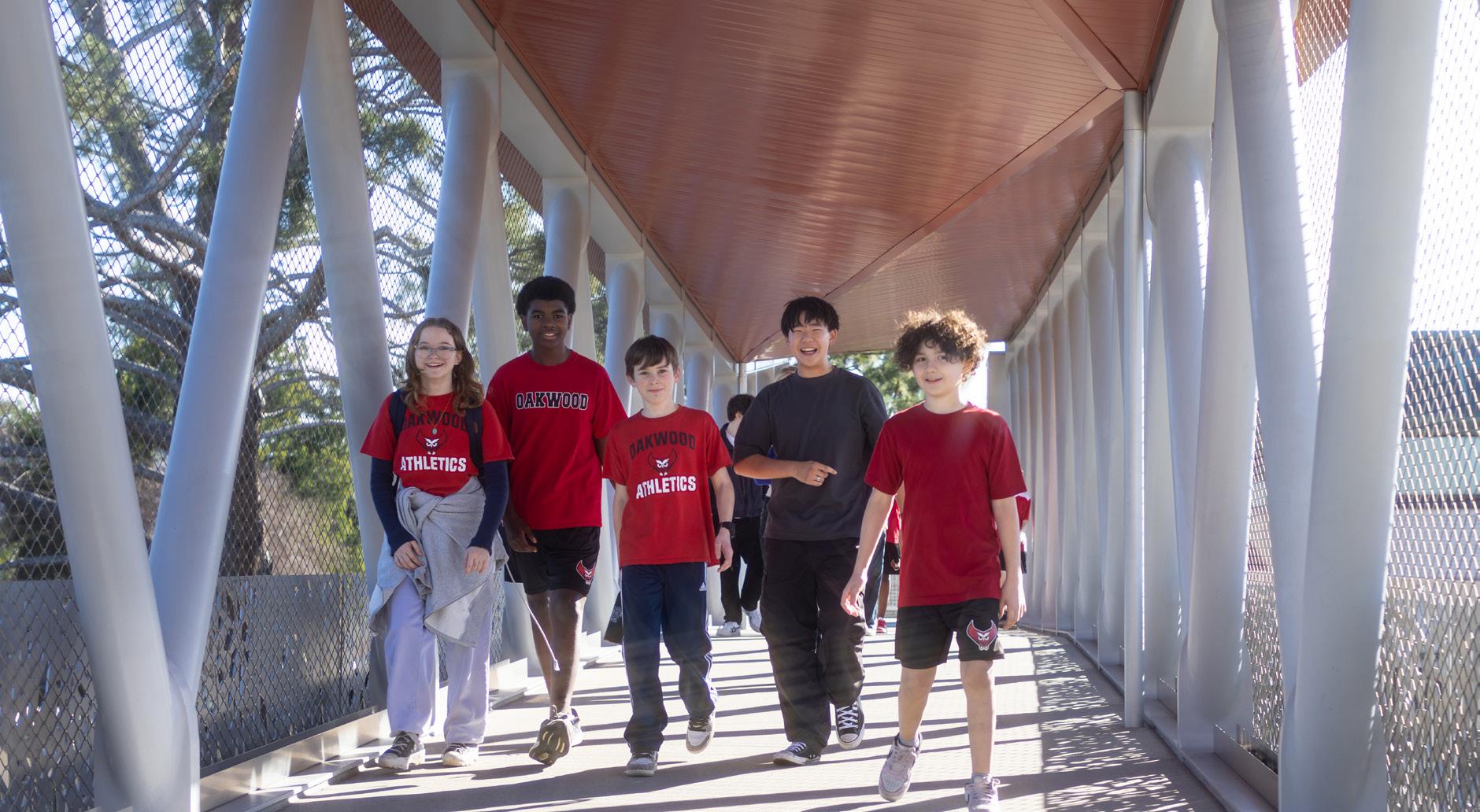
HONORS /A D VANCE D STUDIES COURSES
Nationally ranked & champion debate teams
OVER 50 STUDENT-LED CLUBS, INCLUDING THIRTEEN AFFINITY/ALLIANCE GROUPS
Member of the International Thespian Society
Four Oakwood Hydrogen Racing Teams filled the winners’ podiums at the Regional, State, and 3x World Championships of the Horizon Grand Prix
An athletic center with two full-size competition basketball and three full-size volleyball courts INCLUDING THE 2019 OSCAR FOR BEST DOCUMENTARY SHORT: PERIOD. END OF SENTENCE

74 ZIP CODES represented by Oakwood families ON CAMPUS PRACTICE FIELD WITH BATTING CAGES AND TURF 12,000 ft2
A STATE-OF-THE-ART STRENGTH TRAINING AND CONDITIONING ROOM
2,274 tickets sold FOR THEATER, DANCE, AND MUSIC PRODUCTIONS
17 ATHLETIC TEAMS ADVANCED TO THE CIF-SS PLAYOFFS IN THE PAST 2 YEARS
34
ATHLETIC DIRECTOR; STEVE SMITH, WNBA COACH
85% of middle school students play at least one sport 65% of high school students play at least one sport STUDENTS IN THE SENIOR CLASS
100% OF OAKWOOD GRADS WHO APPLIED ARE ADMITTED TO 4-YEAR COLLEGES & UNIVERSITIES OAKWOOD ATHLETES EARNED ALL-LEAGUE RECOGNITION, AND TWO STUDENTS WON LEAGUE MVP HONORS
OF RECOMMENDATION 173 AND WROTE TO

COMMUNITY ROOM, KITCHEN, AND NORTH CAMPUS COURTYARD
MIDDLE SCHOOL PRINCIPAL
ASSISTANT HEADS OF SCHOOL
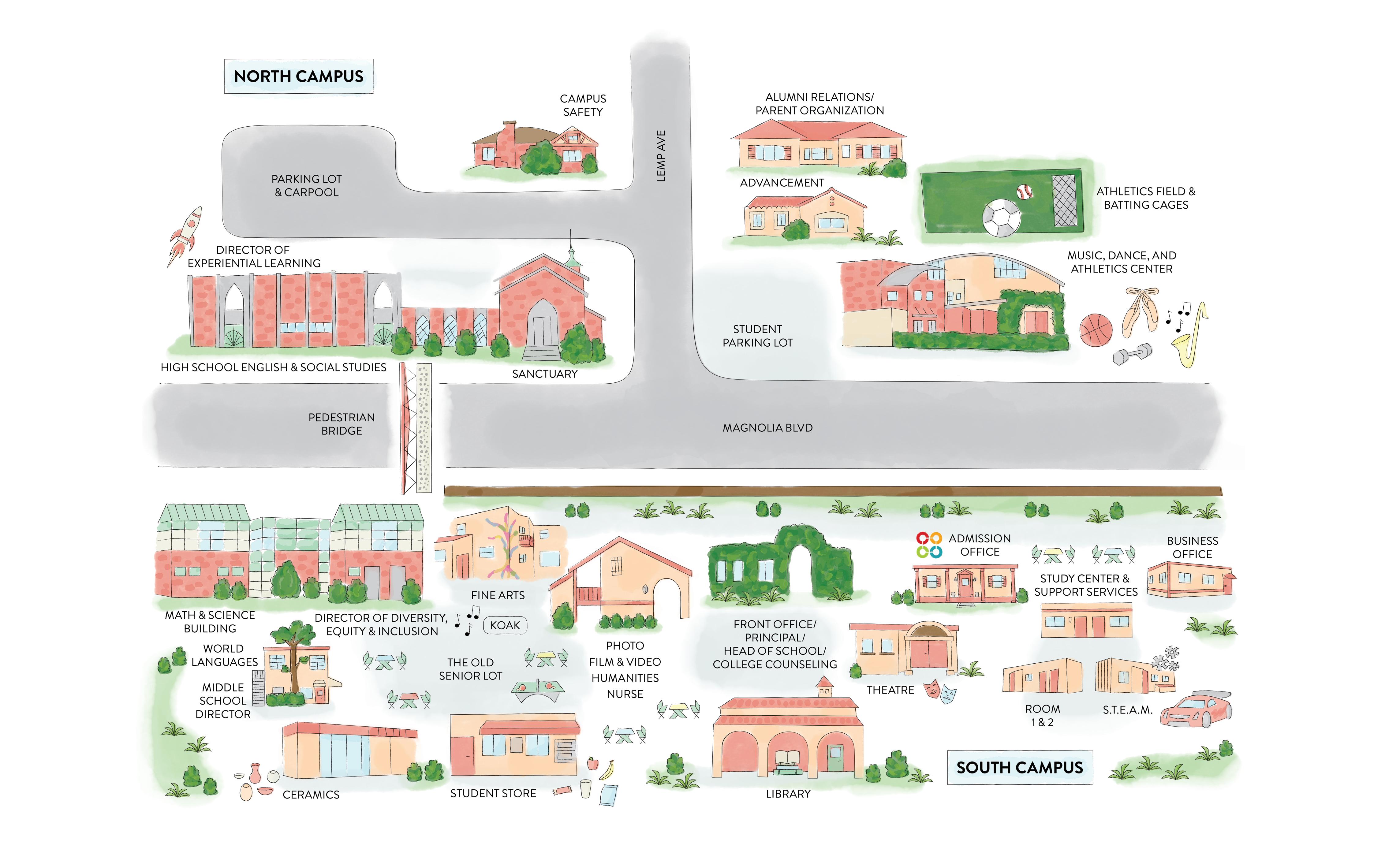

ALUMNI RELATIONS/ PARENT/GUARDIAN ORGANIZATION



COURSE OF STUDY AND GRADUATION REQUIREMENTS
Grades Seven and Eight:
• Humanities (2 years)
• Mathematics (2 years)
• Science (2 years)
• World Language—Spanish, French, Mandarin (2 years)
• Electives (2 years) in:
• Visual Arts, Performing Arts, Theatre Arts, Music, Dance, STEAM, Humanities
• Athletics and Physical Education (2 years)
• CalArts/Enrichment (2 years)
• Immersion (2 years)
• Community Engagement (1 semester)
• 7th Grade Seminar (1 semester)
• Human Development (2 semesters)
• STEAM (Optional)
• Research & Media Literacy (1 semester)
Grades Nine through Twelve:
• English (4 years)
Social Studies (3 years)
• Mathematics (3 years including 1 year beyond Algebra II)
• Science (3 years of laboratory science)
• World Language (3 years of one language completed through level III)
• Arts (3 years) in:
• Visual Arts, Theatre Arts, Music, Dance
• Athletics/Physical Education (2 years)
• Computer Science (Optional)
• STEAM (Optional)
• Human Development (2 semesters)
• Immersion (4 years)
• Community Engagement
•
Oakwood’s Advanced Studies program offers high school students in eleventh and twelfth grades the opportunity to engage in the academic disciplines at significant levels of rigor, inquiry, and depth. Developed and delivered by Oakwood’s remarkable faculty, and recognized as UC Honors-approved classes, Advanced Studies courses all afford students the opportunity to:
• Advance towards mastery in specific or interconnected disciplines.
• Demonstrate high levels of engagement and performance in response to complex questions and challenges.
• Plan and carry out deep inquiry, investigation, or research that reflects their individual interests.
• Develop and execute culminating work that extends their learning beyond the classroom.
• Self-reflect and respond constructively to their own work and that of their fellow students.
OAS Courses indicated with *
Quality teaching involves more than mastery of subject matter. It also involves an understanding of the unique and diverse characteristics of students as learners. Director of Support Services and Learning Specialist work alongside teachers and administrators to address the insdividual needs of students by helping teachers and students develop an understanding of the skills required by various classes.
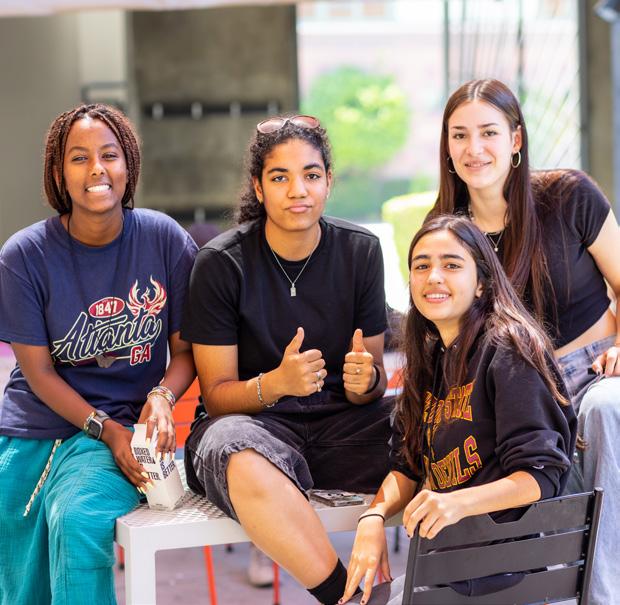

The Academic Resource Center (ARC) is open to students on a daily basis. It is a place where students can work independently and/or meet with faculty from various disciplines for academic and study skills support.
At the midpoint and the end of each term, students and families receive feedback on student progress through formal grade reports. At least twice during the year, families will receive a formal written evaluation or an in-person conference on student progress. Families are always welcome to contact teachers for informal reports on student progress.
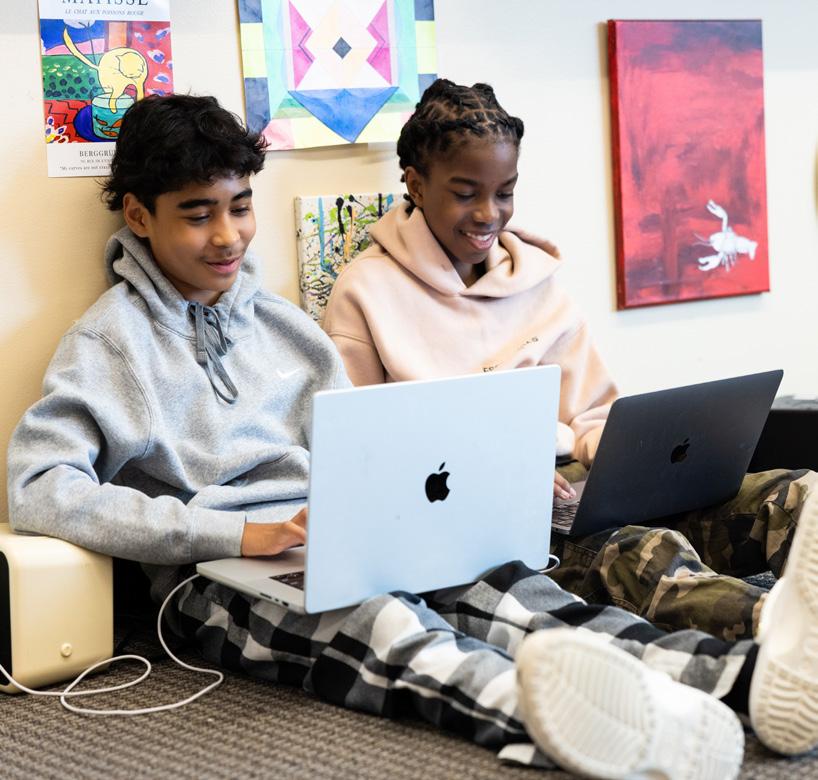
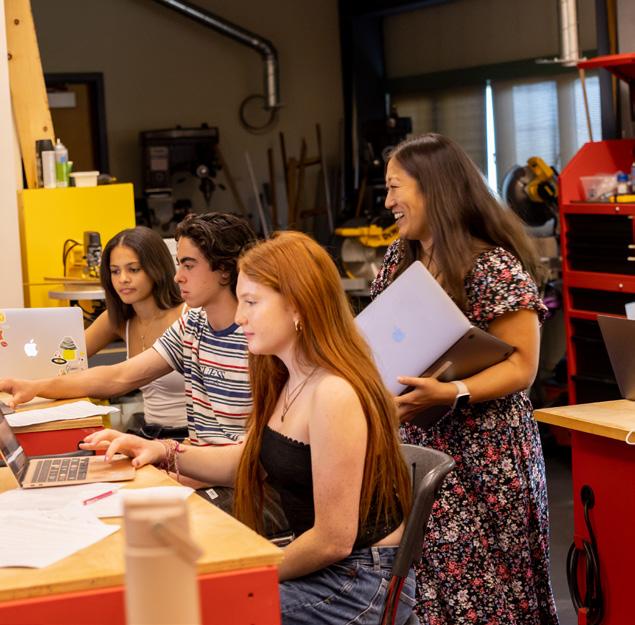
Academic grades represent achievement, both in mastery of content and in proficiency of skills. Students are given letter grades in all subjects 7-12.
A = Excellent (Oakwood does not grant the grade of A+)
B = Good
C = Satisfactory
D = Minimally acceptable*
F = Not passing
INC = Work incomplete at the end of a report period
* Promotion to more advanced work in the same subject may require additional work. The University of California will not grant credit for any course in which a student receives a D.
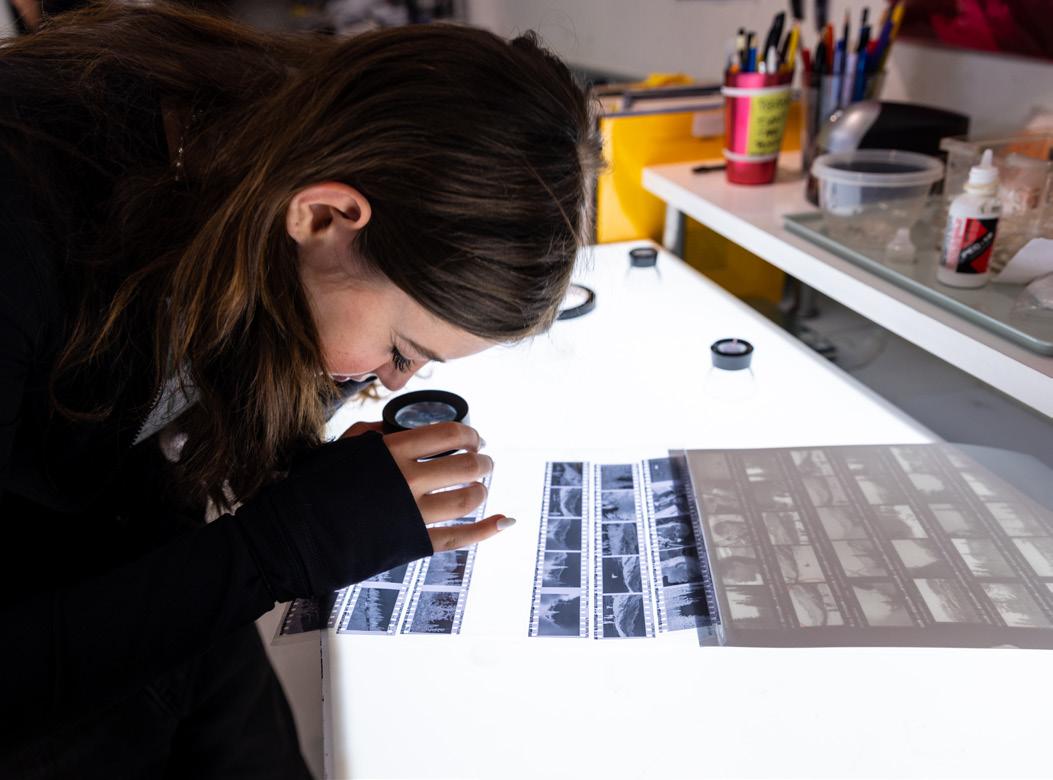
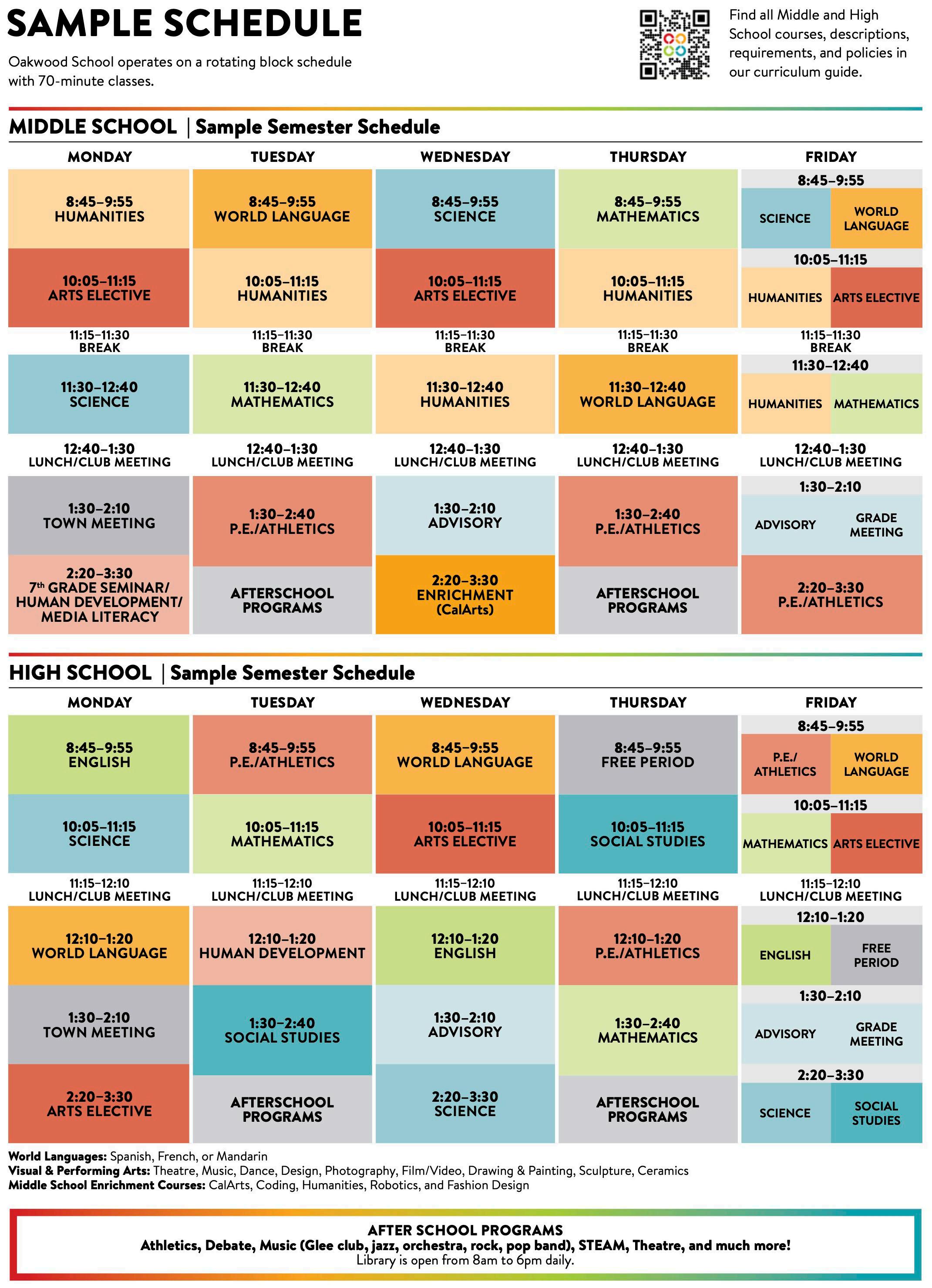
During a typical year, middle school students are expected to enroll in Humanities (Social Studies & English), Science, World Language, Math (three levels), P.E. or a sport, an elective (e.g. Performing Arts, Visual Arts, STEAM), Advisory, 7th Grade Seminar, Human Development, and Community Engagement (8th grade). On Wednesday afternoons, all middle school students enroll in a second elective through CalArts/Enrichment. Blocks are 70 minutes with a ten minute passing period between each class.
The high school schedule mirrors the middle school one in many ways; however, Humanities is separated into individual English and Social Studies courses and students receive a club period instead of CalArts/Enrichment. Additionally, student athletes are given a free period in place of their P.E. and students may select dance to fulfill their P.E. requirement or take dance as an elective. Many high school students elect to enroll in special topic/independent studies during these times.
Middle school and high school students enjoy separate lunch periods, with an all-school lunch on Friday. The Kitchen provides delicious options for all students, faculty, and staff on both campuses.
The 1,800 sq ft state of the art kitchen, servery, and dining area is focused on community and emphasizes Oakwood’s priorities for serving better food in a more environmentally responsible way. Locally-sourced and high-quality ingredients are used to prepare nutritious food from scratch.
Each day fresh meals are prepared for breakfast and lunch, including vegetarian options, plus a salad bar, pasta bar, deli sandwich station, ice cream, beverages, grab-and-go items, and homemade cookies. The Kitchen is also open afterschool for snacks and beverages.
Run completely by Oakwood’s Parent/Guardian Organization, the Student Store is open daily and provides healthy snacks, grab-and-go items from the kitchen, and lots of treats. Both the Kitchen and the Student Store are cashless, and students use their student ID cards to purchase items.

Through experiential learning, we seize opportunities to inhabit the spaces between traditional and progressive pedagogy, and we increase the permeability between the classroom and the world around us.
Oakwood School’s Immersion Program provides an intense two-week period in the academic year for students to be fully immersed in rich and challenging learning experiences—in ways not possible during the regular academic schedule. Immersion courses are experiential: learning is hands-on, exploratory, unrestricted by the boundaries of the regular classroom.
8th Grade American Studies: Close-Up (Washington D.C.)
African Food and Music (New Orleans)
Art & Protest: Accelerating Social Change
California Drought: The Grapes of Wrath Today (Northern California)
California Marine and Coastal Ecosystems (Sail to Catalina Island)
California Traditional Ecological and Indigenous Knowledge (Northern California)
Computer Animation
Cooking and Culture
Discovering Mysterious Patterns Around Us
Exploring and Debunking the Myths of the Spanish Conquest (Mexico)
Grassroots Activism
Images and Words: Exploring the Art and Interplay of Image-Making and Writing
Migrant Foodways in Los Angeles
Off the Wall: Honoring Indigenous Peoples Through Mural Making (Mexico)
Protest Music
Race, Power, and Justice in Los Angeles
Renewable Energy (Massachusetts)
Sustainable Fashion: Sewing, Design, and Creating a Brand
The Pad Project at the UN Commission on the Status of Women (New York)
Urchin Slaying: Navigating the Southern California Kelp Forest Ecology
Voices of History: Holocaust & Antisemitism
Who are We? Understanding the Legacies of Colonialism and Racism (Maryland & Virginia)
We believe the habit of service, volunteerism, and a commitment to engaging with the most marginalized members of a community must come from the individual and Oakwood is dedicated to a Community Engagement program that seeks to develop these qualities internally and not based upon an imposed quota of service hours. Oakwood’s philosophical focus on nurturing empathy, imagination, and moral courage, fostering responsibility, humility, and a commitment to social justice, develops awareness.
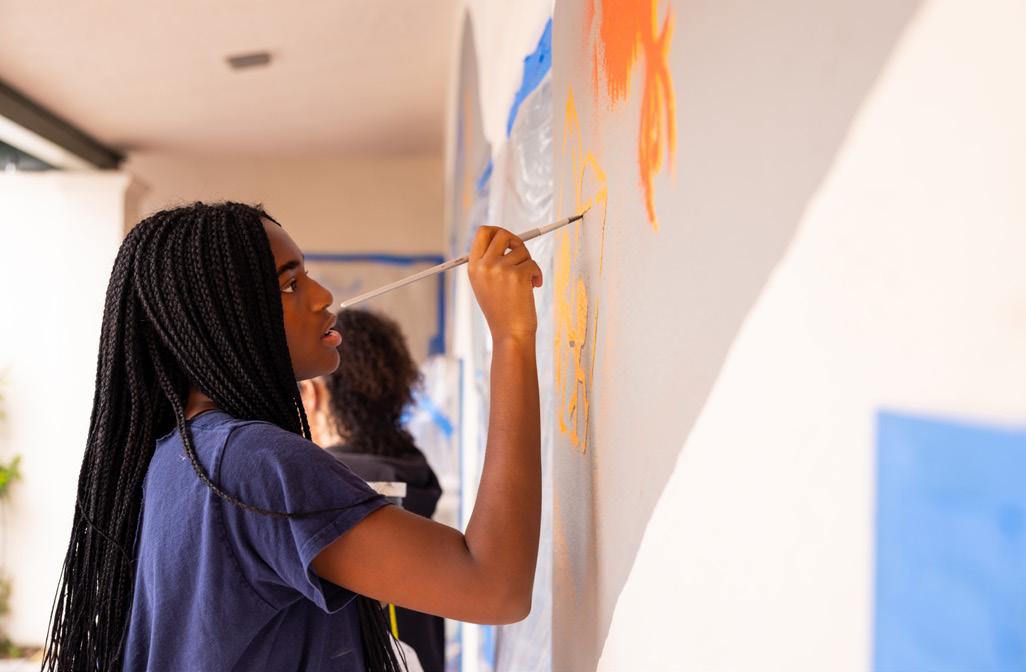
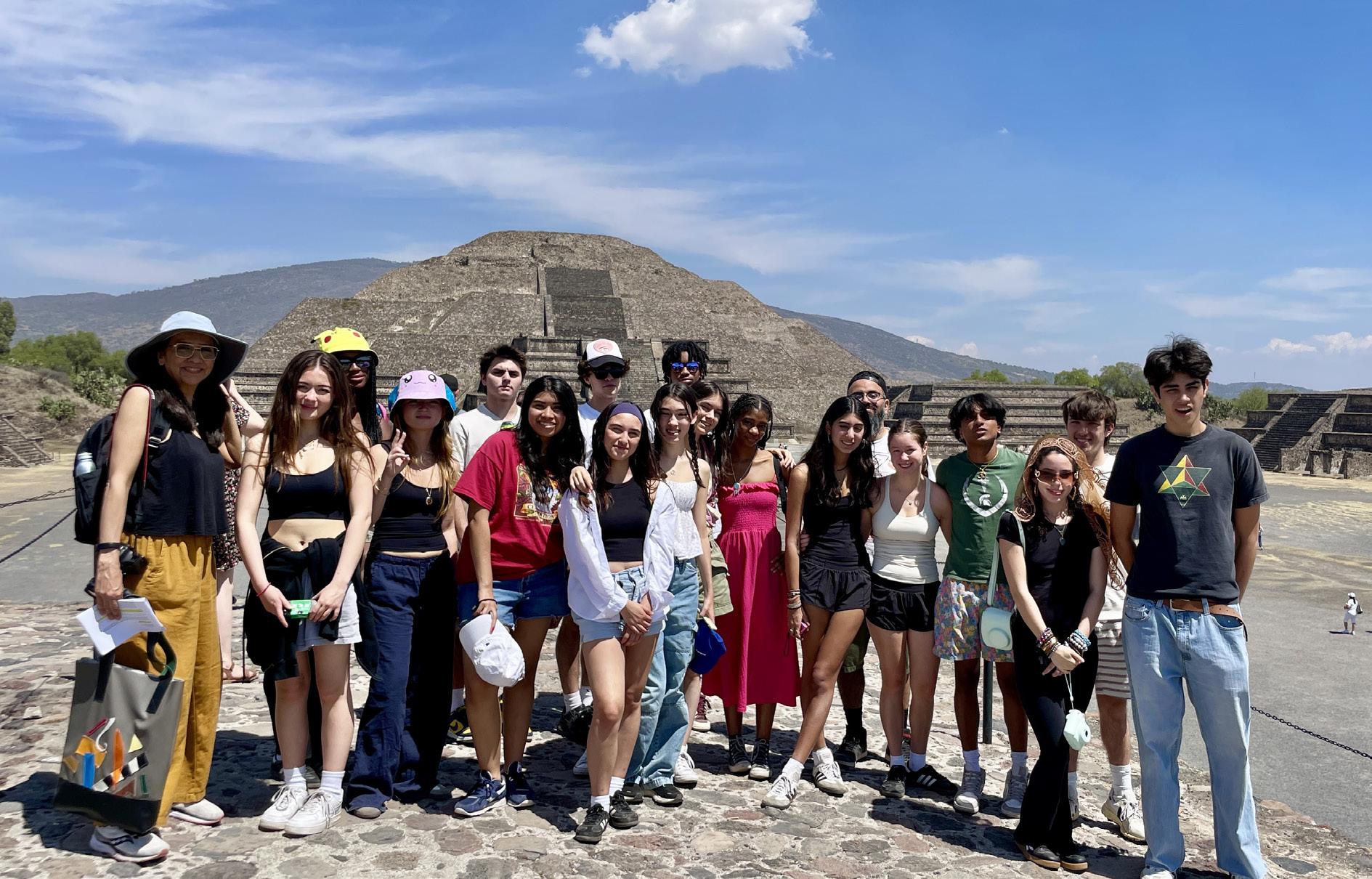
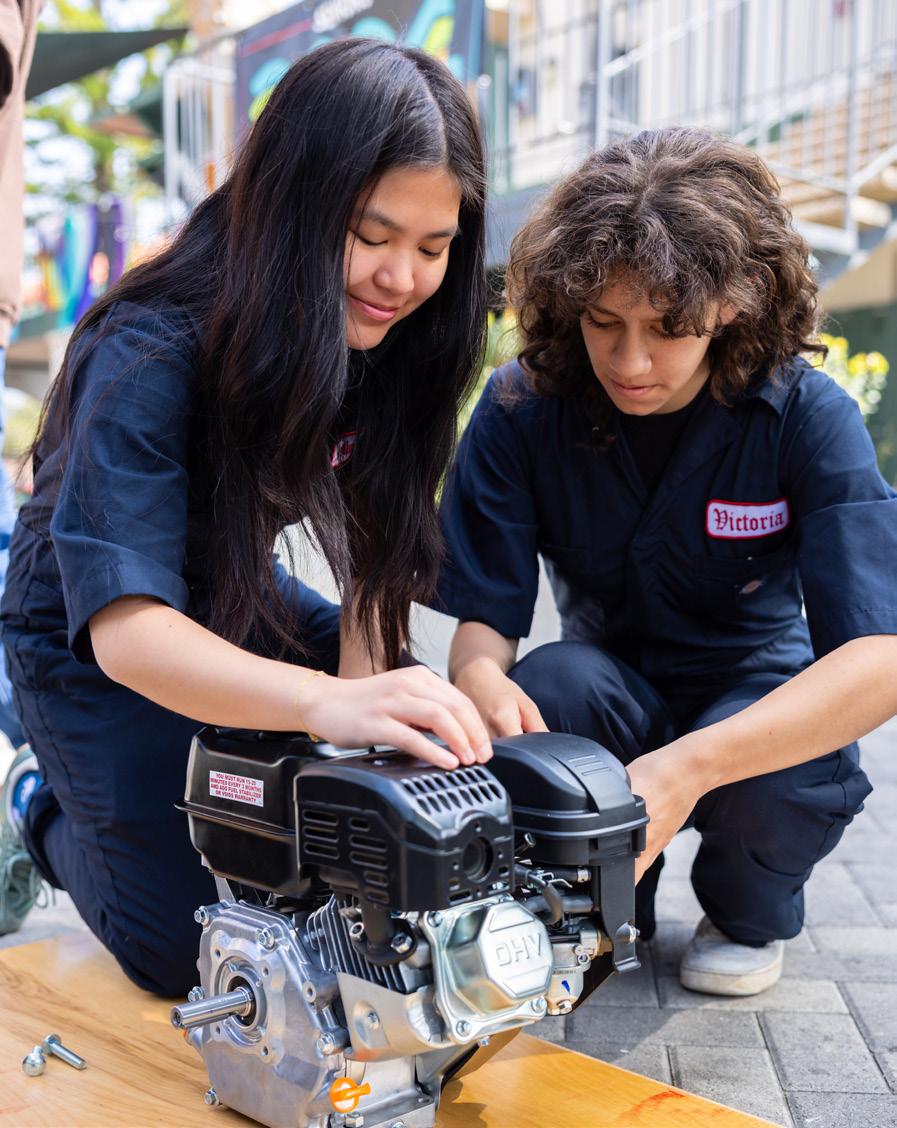

Community Youth Partnership offers Oakwood elementary students free weekly classes in music, dance, visual arts, and science. These classes are taught exclusively by Oakwood high school students who have shown a proficiency in the arts and science, and an interest in community-building. Oakwood students meet each week with their group and faculty advisor to discuss and develop their own curriculum.
BLOOD DRIVE: Students organize a blood drive with Cedars Sinai Medical Center.
COMIC BOOK LITERACY PROGRAM: Students teach the joy of reading to other children through the use of comic books.
PAD PROJECT: Students support girls education with partner schools in India, Sierra Leone, Morocco, and Nigeria.
GLOBAL GENDER JUSTICE SUMMIT: Students host a bi-annual conference open to the community to discuss global gender issues.
STUDENTS HAVE ALSO PARTNERED WITH:
AIDS Walk
American Cancer Society
Animal Rights: Helping Paws
Big Sunday
Chiapas Project
Children’s Hospital of Los Angeles
Food Bank
Habitat for Humanity
Jenesse Center
LA Family Housing
PEP LA
Shoes You Could Use
SOVA
Tree People Water Project
After having completed their course work in May, seniors devote two weeks pursuing a current interest or experimenting with a new idea. Senior Projects have included making documentary films, conducting oral history projects with senior citizens, assisting with the Special Olympics, working for a political campaign, apprenticing in a law office, participating in programs to assist the homeless, serving as an apprentice to a craftsperson, organizing a neighborhood watch, and working on construction of the new gym. The projects culminate in a symposium for peers, faculty, administrators, and parents/guardians, as seniors present the details of each project.
The goal of Oakwood’s trips program is to encourage socialization and class cohesion while giving students the opportunities to make curricular connections beyond the classroom.
• 7th Grade–Cedar Lake
• 8th Grade–American Studies: Close-Up (Washington D.C.)
• 9th Grade–Kern River
• 11th Grade–Russian River
• 12th Grade–Palomar Mountain
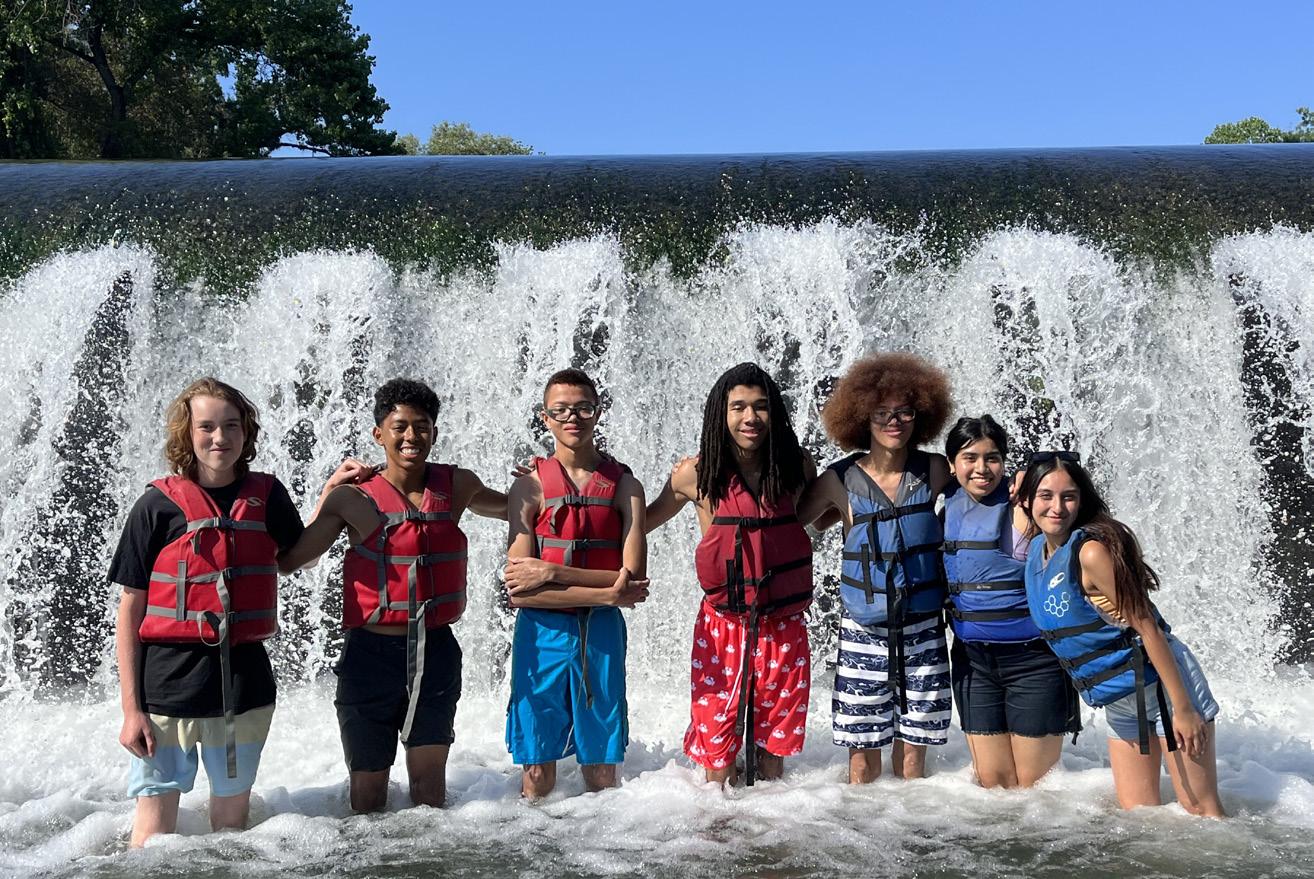
Oakwood School continuously strives to create a trusting, respectful, and inclusive learning environment and culture, inside and outside the classroom, where students feel confident to express and develop their own voice, values, and gifts; where students gain the skills and knowledge to critically assess their own and others’ assumptions and biases in order to reach less binary, more nuanced conclusions; where students understand problems and solutions from multiple points of view; and where students can form authentic, meaningful, and rich relationships across areas of difference. With the guidance of an Assistant Head of School for Community Engagement and Belonging and a Dean of DEIB, our goal is to connect, empower, and support students, as well as promote the richness and diversity of their diverse cultures within and outside of Oakwood.
The term affinity group is used as a bringing together of people who have an identifier in common, e.g. race, gender, religion, family status, etc. Affinity groups are for individuals who identify as members of the group and can speak to the experience of being a member of the group from the “I” perspective. Affinity groups allow for:
• Creating an opportunity for a critical mass experience for underrepresented/marginalized/subordinate-culture groups
• Providing a safe environment where people who share a racial/ethnic/cultural identity can come together for building community, fellowship and empowerment
• Identifying and discussing issues related to racial/ ethnic/cultural identity development
• Building resilience and sharing successes
• Promoting ideas for action
• Preparing for deep and honest cross-cultural conversation and collaboration with other affinity groups
OAKWOOD AFFINITY GROUPS
• Asian Affinity Group (RepresentAsian)
• Black/Brown Mentors of Oakwood Representing Excellence (BMORE)
• Connecting African, African American and Multiracial African American Students at Oakwood (CAAMASO)
• Daughters for Inclusive Values and Social Justice (Divas of Color)
• Jewish Affinity Group
• Neurodiversity Affinity Group
• Greater Middle Eastern Affinity Group
• Multiracial Affinity Group
• Somos Unidos
• Adopted Affinity Group
The term alliance group is used as a bringing together of people who have common commitments to an identifier group, e.g. race, gender, sexual orientation, religion, family status, etc. Alliance groups are for individuals who identify as members of the group and/or as people who support and stand in solidarity with that group.
OAKWOOD ALLIANCE GROUPS
• Rainbow Alliance
• GECO (Gender Equality Coalition at Oakwood)
• White Anti-Racist Student Group
The term interest group is used as a bringing together of people who want to learn about, share and engage in a special interest, e.g. hobby, skill, topic, etc. Interests groups are for individuals who want to gather to teach, learn and share.
OAKWOOD INTEREST GROUPS
• Cultural Awareness in Solidarity Alliance (caSa)
• Oakwood Students for Progressive Reform
Humanities is the study of our language, culture and ideas. An interdisciplinary, foundational, middle school course combining English and Social Studies provides a comfortable “home base” in the midst of our 7-12 community. Students explore the causes and effects of social and political change through history, literature, and culture.
Particular emphasis is placed on the teaching of essential student skills that prepare them for high school. Seventh grade and eighth grade Humanities students will be able to:
• Develop and communicate an argument supported by textual evidence. In discussions and writing, students explore identity through developing an authentic voice and style in composition and creative writing by writing clearly, passionately, and persuasively. Students learn grammatical skills that support their writing.
• Read closely and analyze fiction, nonfiction, primary and secondary sources, images, maps, and other visual media while fostering the act of self-reflection while reading. We lead our students toward becoming lifelong readers.
• Learn interpersonal skills and cultural competency. Students will learn communication skills, especially in their interactions with people of different cultures. Students will thoughtfully investigate and reflect on how one’s layers of cultural identities both shapes and contributes to a multicultural society.
• Think critically and imaginatively, and make intelligent evidentiary connections between diverse narratives.
• Grapple with research questions by evaluating and properly utilizing sources and become adept at paraphrasing, embedding, and citing quotations.
• Take responsibility for one’s own learning, build independence, accountability, and time management skills.
Grade Seven
Grade Eight
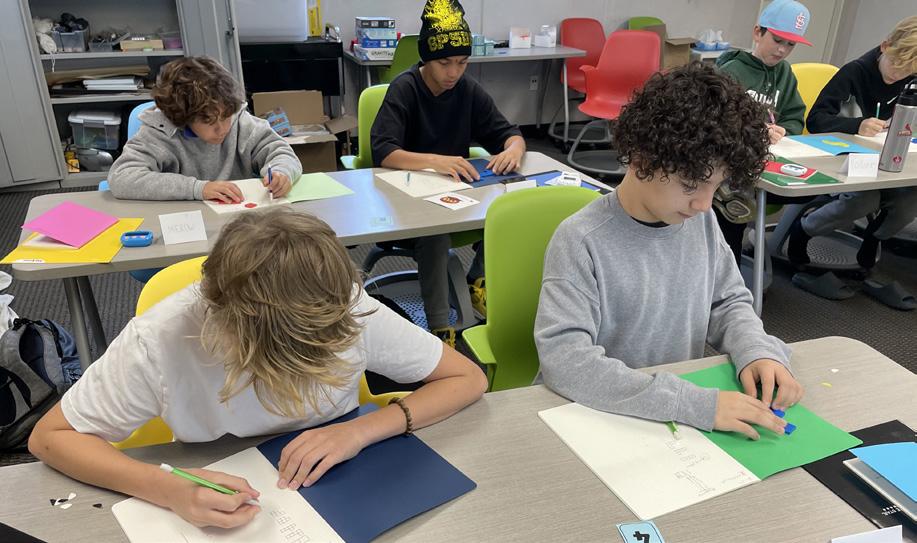


The power of words to enchant and to enlighten influences and guides the goals of the English Department. As members of a literary community, faculty and students are engaged in the development of skills as well as the appreciation of ideas.
Completion of the curriculum in a given year establishes a common experience of reading and writing upon which the subsequent year builds. Seniors choose from several elective courses.
In every course, we expect students to move closer to achieving the following goals:
• Become lifelong readers who find that reading is a joy.
• Learn the elements of literary analysis.
• Develop and expand vocabulary knowledge.
• Sharpen reasoning skills.
• Learn to approach writing as a process.
• Discover an authentic voice in writing.
• Participate confidently in discourse.
• Use critical and supplemental materials appropriately.
ENGLISH
Grade Nine
BRITISH & WORLD LITERATURE
Grade Ten
AMERICAN LITERATURE
Grade Eleven
HONORS AMERICAN LITERATURE
Grade Eleven
ADVANCED STUDIES LITERATURE AND COMPOSITION *
Grade Twelve
ADVANCED STUDIES LANGUAGE AND COMPOSITION *
Grade Twelve
CREATIVE WRITING
Grades Eleven and Twelve
MODERN AMERICAN LITERATURE
Grade Twelve
SCIENCE FICTION: UTOPIAS AND DYSTOPIAS
Grade Twelve
TRUTH AND FICTION
Grade Twelve
* Oakwood Advanced Studies (OAS) Course
See pg. 12 for more information.
The Computer Science program prepares students for the ever-increasing presence of technology in the world. In seventh and eighth grade, technology is integrated into the middle school Humanities, Science and Math curriculum. High school electives offer enrichment opportunities in advanced studies Computer Science theories and programming languages. The newly redesigned computer lab features a flexible space with state-of-the-art technology and is open for teachers to bring their classes for enhanced instruction as well. The lab is also available for student use during select periods.
WEB DESIGN/DEVELOPMENT
Grades Nine through Twelve
INTRODUCTION TO COMPUTER SCIENCE PRINCIPLES
Grades Nine through Twelve
SCIENCE PRINCIPLES
Grades Ten through Twelve
ADVANCED STUDIES COMPUTER SCIENCE A *
Grades Eleven and Twelve

The primary goal of the Mathematics curriculum is to help students gain familiarity and facility with the language of mathematics. While developing their computational, logical, and analytical skills, we encourage our students to become active, creative problem solvers. We stress the historical sig-
nificance as well as the practical applications of the concepts we teach. Our students learn the role of mathematics in other fields of study. We hope our students will carry with them an appreciation of the beauty of mathematics throughout their adult lives.
STRUCTURE OF THE MIDDLE SCHOOL MATHEMATICS CURRICULUM
Eight
Students take one of the following courses as determined by the Mathematics Department after considering available grades, evaluations, and standardized test scores from their 6th grade work.
PRE-ALGEBRA
ACCELERATED PRE-ALGEBRA
ALGEBRA I
Students take one of the following courses as determined by the Mathematics Department after considering available grades and evaluations from their 7th grade work.
ALGEBRA IA
ALGEBRA I
GEOMETRY
STRUCTURE OF THE HIGH SCHOOL MATHEMATICS CURRICULUM
Sequence 1
Grade 9: Algebra IB
Grade 10: Geometry (Regular/Honors)
Grade 11: Algebra II (Regular/Honors)
Grade 12: Pre-Calculus (Regular/Honors) and/or Mathematics electives
Sequence 2
Geometry (Regular/Honors)
Algebra II (Regular/Honors)
Pre-Calculus (Regular/Honors)
Calculus (Regular), or Advanced Studies * Calculus A/Statistics, or Advanced Studies * Calculus A/Calculus B, or Mathematics electives
MATHEMATICS ELECTIVES include Statistics, Discrete Mathematics, Advanced Studies Algebra with Financial Applications, and Philosophy of Math. Recent independent study courses have included Multivariable Calculus, Differential Equations, and Transition to Higher Mathematics (an introduction to set theory, logic, and more).
Sequence 3
Algebra II (Regular/Honors)
Pre-Calculus (Regular/Honors)
Calculus (Regular/Advanced Studies) *
Choices: Advanced Studies Number Theory *, Mathematics electives, and/or Independent study
HONORS COURSES: High school honors courses in Geometry, Algebra II, and Pre-Calculus delve deeper into topics and require students to solve complex problems, fostering independent thinking and strong algebra skills. To advance to the next honors course, students must earn a B or higher, while those with solid A’s in non-honors courses can apply based on their performance, summer work, and a readiness assessment.
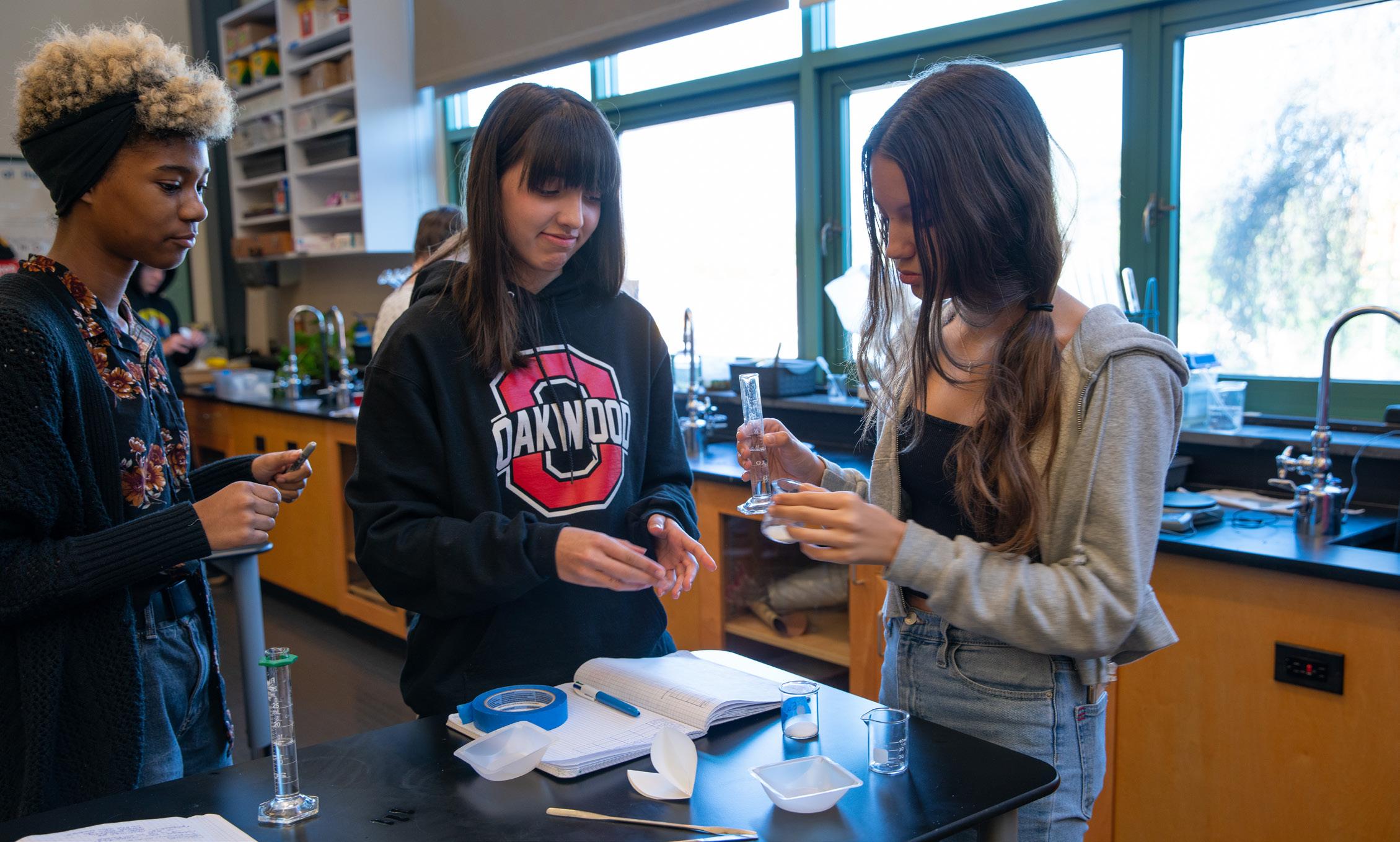

The Science Department strives to provide students with exposure to the core scientific disciplines (i.e. Biology, Chemistry, and Physics) and to develop skills that enable our students to be successful in all areas of study. At all levels, students will engage in developing scientific reasoning skills through hands-on investigations and that allow students to directly apply their learning to experiments and projects.
The middle school science program is designed to develop a skill set that will be used throughout a student’s academic career. Although all middle school students take the same course, the focus of the 7th grade and 8th grade curriculum is varied in order to be responsive to the developmental needs of the students and relevant to students’ lives.
The path through the high school science program is designed to be flexible so that students can build a course of study that suits the individual student’s interest, developmental needs, and academic skills. Since students are not placed in a track, they are free to move from one discipline to another and alter the rigor of their program in response to their individual performance, needs, and interest. In addition, some of the elective courses allow students to break from the traditional path so that they can develop and strengthen skills before they proceed to the next class.
The table below shows several possible pathways through the science curriculum. There is no absolute pathway as we strive to allow for an individualized curriculum that meets the needs of each student.
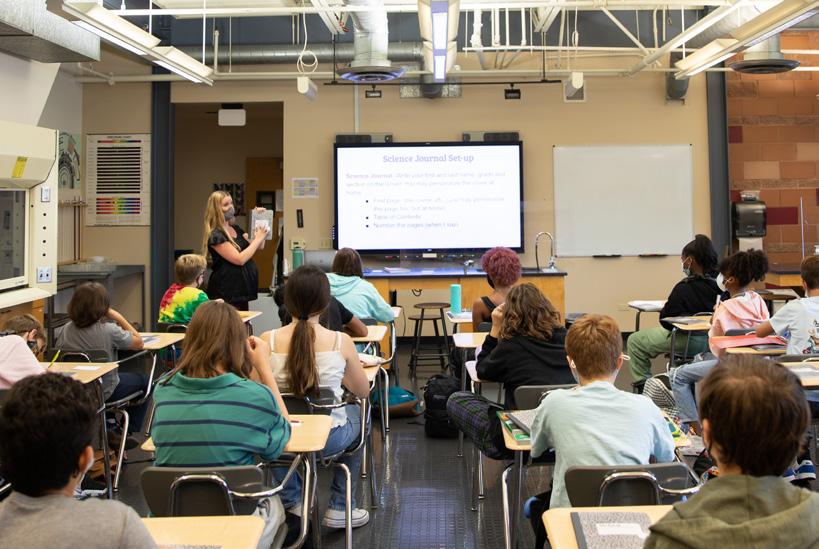

In grades nine through twelve, as long as students meet the co-requisites and prerequisites, they are able to request any science course they have not yet taken. In addition, their eligibility for admission requires the permission of the science department.
Honors and Advanced Studies courses require a significant level of dedication from students to cope with the level of discourse and workload required for a given course. The approval process is intended to assess students’ potential to be successful in a course, taking into account all of their other obligations in school.
GENERAL SCIENCE I: LIFE SCIENCE
Grade Seven
GENERAL SCIENCE II: PHYSICAL SCIENCE
Grade Eight
BIOLOGY
Grade Nine
HONORS BIOLOGY
Grade Nine
CHEMISTRY
Grade Ten
HONORS CHEMISTRY
Grade Ten
PHYSICS
Grades Eleven and Twelve

HONORS PHYSICS
Grades Eleven and Twelve
HONORS PHYSICS WITH CALCULUS
Grades Eleven and Twelve
PHYSICS II
Grade Twelve
ASTRONOMY
Grades Eleven and Twelve
ENVIRONMENTAL SCIENCE
Grades Eleven through Twelve
BOTANY
Grades Eleven and Twelve
MARINE BIOLOGY
Grades Eleven and Twelve
HUMAN ANATOMY AND PHYSIOLOGY
Grades Eleven and Twelve
ADVANCED STUDIES CHEMISTRY *
Grades Eleven through Twelve
ADVANCED STUDIES BIOLOGY *
Grades Eleven through Twelve
ADVANCED STUDIES PHYSICS C: ELECTRICITY & MAGNETISM *
Grade Twelve
The Social Studies curriculum includes the study of history, government, philosophy, economics, culture, and the social sciences. It is designed to provide students with a view of human experience as that involving real people struggling with real problems, and an understanding that the forces and issues that informed those struggles still affect us today. In the ninth and tenth grades, all students follow a course of study in global history from the Neolithic to the 21st century. In the eleventh grade, students study the history of the United States.
In both the eleventh and twelfth grades, students can pursue particular areas of interest by choosing from a number of electives including Advanced Studies courses, a variety of established courses, and independent studies. Emphasis throughout the curriculum is on the development of critical thinking skills: acquiring, analyzing, and evaluating information through reading and research, and the communication of ideas in clear expository prose.
GLOBAL HISTORY I
Grade Nine
GLOBAL HISTORY II
Grade Ten
AMERICAN HISTORY
Grade Eleven
ADVANCED STUDIES
UNITED STATES HISTORY *
Grade Eleven
* Oakwood Advanced Studies (OAS) Course
See pg. 12 for more information.
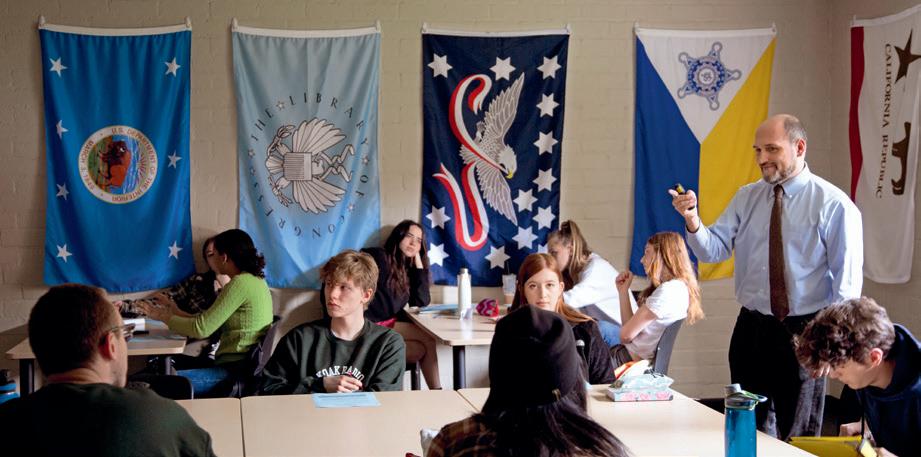
SAMPLE ELECTIVE COURSES
PHILOSOPHY AND SOCIAL ISSUES
ADVANCED STUDIES GLOBAL ISSUES *
THE AMERICAN WEST
U.S. LATINX STUDIES
CULTURE AND VALUES IN 2OTH CENTURY AMERICA
ADVANCED STUDIES ART HISTORY: ART AND THE OTHER *
CAMPAIGNS AND ELECTIONS IN THE UNITED STATES
GENDER STUDIES
EDUCATION THEORY
THE HISTORY OF SCIENCE, TECHNOLOGY, AND MEDICINE IN THE UNITED STATES
ADVANCED STUDIES GLOBAL ISSUES: POPULATION GROWTH, MOVEMENT, AND CONFLICT *
ADVANCED STUDIES: CIVIL RIGHTS AND CIVIL LIBERTIES *
THE FIRST WORLD WAR
GLOBAL COUNTER CULTURES
ARTS & ARCHITECTURE IN LOS ANGELES
ADVANCED STUDIES CHECKS AND BALANCES *
STEAM intertwines the multiple disciplines of Science, Technology, Engineering, Art, and Math into one curriculum. Through experimentation and problem solving, students encounter real world applications of design. This unique department allows students to engage fully in every stage of the process –from conception and design to its physical production. If students can dream the idea, STEAM possesses all the technology and tools to bring their visions to fruition. The 1400 sq. ft. Engineering Lab features CNC Router Machines, one-to-one 3D printers, laser cutters, water jet cutters, and numerous power tools (drill press/miter saw/band saw).
INTRODUCTION TO DESIGN THINKING
Grade Eight
EXPLORATION INTO MAKING
Grades Nine and Ten (May be repeated with permission from instructor)
FROM SKETCH TO FABRICATION: THE DESIGN PROCESS AT WORK
Grades Eleven and Twelve
STEAM OPPORTUNITIES:
For the past four years, Oakwood has participated in the JPL Annual Invention Challenge. Over a hundred schools gather to compete against each other and 35 JPL engineers. Oakwood holds a record first place title for all four years.
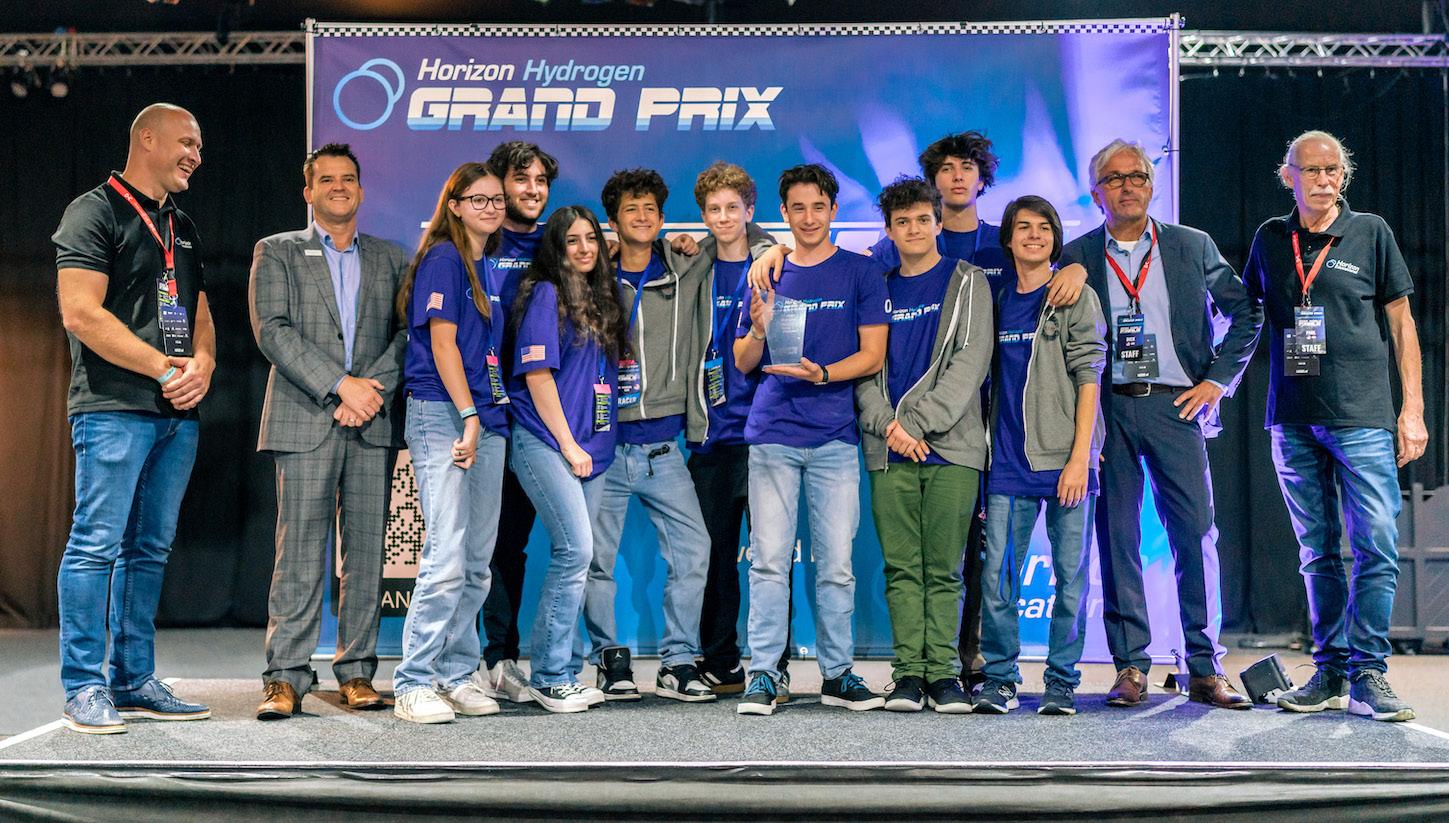

The Oakwood Racing Team continued to thrive locally, nationally, and internationally. Students are tasked to design, engineer, and build their own fuel cell-powered RC car. This afterschool team empowers students to be the problem-solvers of tomorrow, connect with the Earth’s automotive industry, and gear it up with renewable energy technology. Oakwood qualified during the SoCal Regionals and moved on to the State finals, finishing 1st, 3rd, 4th and 5th. The 1st and 2nd place teams then moved on to the Horizon Grand Prix World Finals to represent the USA, which was held in the Netherlands. Oakwood teams dominated and placed 1st and 2nd at the World Finals. Oakwood also received numerous special awards for fuel efficiency and the pit award for the team that was best organized and well-coordinated throughout the six-hour race. Go Wood!
Maker Faire showcases the amazing work of all kinds and ages of makers. With over 150,000 people in attendance, Oakwood sent over 40 students grades 7-12 to present four interactive booths: student built mini arcades, laser cut/3D gravity racers, 3D printed upside down tops, and a 3D bubble printers.

The Department’s mission is to help students become tolerant, open-minded citizens and sensitive, knowledgeable people who understand linguistic and cultural diversity and can adapt to change as competitive participants in our increasingly diverse, multicultural, and global society. We strive to help students develop the linguistic, literary, and cross-cultural competence necessary to live, work, and be lifelong learners in our diverse world.
The overreaching goals of the World Languages Department are for students to communicate effectively, to understand the target language and culture, and to respond appropriately and respectfully to cultural differences. Students make connections with other disciplines by applying learning from language class to relevant situations in other classes. Students use the language to investigate, explain, and reflect on the concept of culture through comparisons of the cultures studied and their own. They also demonstrate cultural awareness based on understanding of and respect and other cultures, past and present.
FRENCH IA Grade Seven
FRENCH IB Grade Eight
High School
FRENCH I
FRENCH II
FRENCH III
FRENCH IV
ADVANCED STUDIES FRENCH Grade Twelve *
MANDARIN CHINESE IA Grade Seven
MANDARIN CHINESE IB Grade Eight
High School
MANDARIN CHINESE II
MANDARIN CHINESE III
MANDARIN CHINESE IV
MANDARIN CHINESE V
SPANISH IA Grade Seven
SPANISH IB Grade Eight
High School
SPANISH I
SPANISH II
SPANISH III
SPANISH IV
SPANISH IV HONORS
SPANISH V
ADVANCED STUDIES SPANISH *
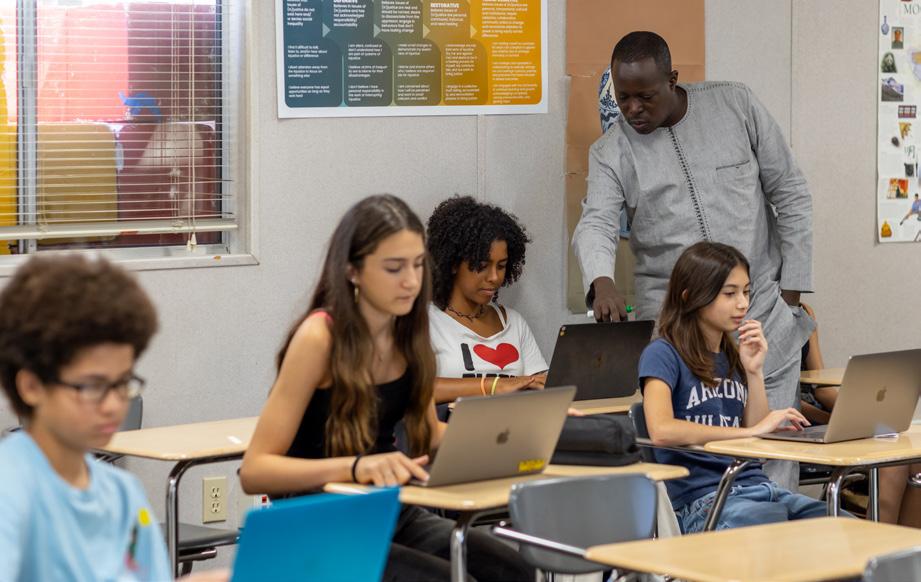
At Oakwood, we aim to help our students learn how to challenge and question the world around them, to treat each other better and to aspire to a future that is hopeful. In the performing arts, we show our students the linguistic and non-linguistic skills and strategies to accomplish these goals. We want our students to feel like they are a part of an artistic
MIDDLE SCHOOL DANCE COMPANY
Grade Eight
MIDDLE SCHOOL DANCE CREW
Grade Eight
INTRODUCTION TO PERFORMING ARTS
Grade Seven
CONTEMPORARY DANCE FORMS
Grades Nine through Twelve
MODERN DANCE
Grades Nine through Twelve
BALLET
Grades Nine through Twelve
JAZZ DANCE FOR MUSICAL THEATRE
Grades Nine through Twelve
HIP HOP
Grades Nine through Twelve
HIP HOP DANCE TEAM
Grades Seven through Twelve
CONTEMPORARY DANCE PRODUCTION
Grades Eleven and Twelve
CHOREOLAB (ADVANCED STUDIES DANCE
ENSEMBLE)
Grades Nine through Twelve
In high school, students may also elect to enroll in dance as P.E.
community that is supportive and allows for vulnerability and passion. The Performing Arts Department offers a wide range of classes and experiences so that every student can find a place and a mentor to guide them to their highest artistic potential. In addition to the courses below, there are countless afterschool offerings.
MIDDLE SCHOOL GLEE
Grades Seven and Eight
BEGINNING STRINGS
Grades Seven and Eight
BEGINNING BRASS
Grades Seven and Eight
BEGINNING WOODWINDS
Grades Seven and Eight
MIDDLE SCHOOL ORCHESTRA
Grades Seven and Eight
MIDDLE SCHOOL ADVANCED CHAMBER
ENSEMBLE
Grades Eight
JAZZ/ROCK BAND
Grades Seven and Eight
HIGH SCHOOL VOCAL ENSEMBLE
Grades Nine through Twelve
HIGH SCHOOL ORCHESTRA
Grades Nine through Twelve
CHORALIERS
Grades Nine through Twelve
CHAMBER MUSIC
Grades Nine through Twelve
MUSIC COMPOSITION
Grades Eleven and Twelve
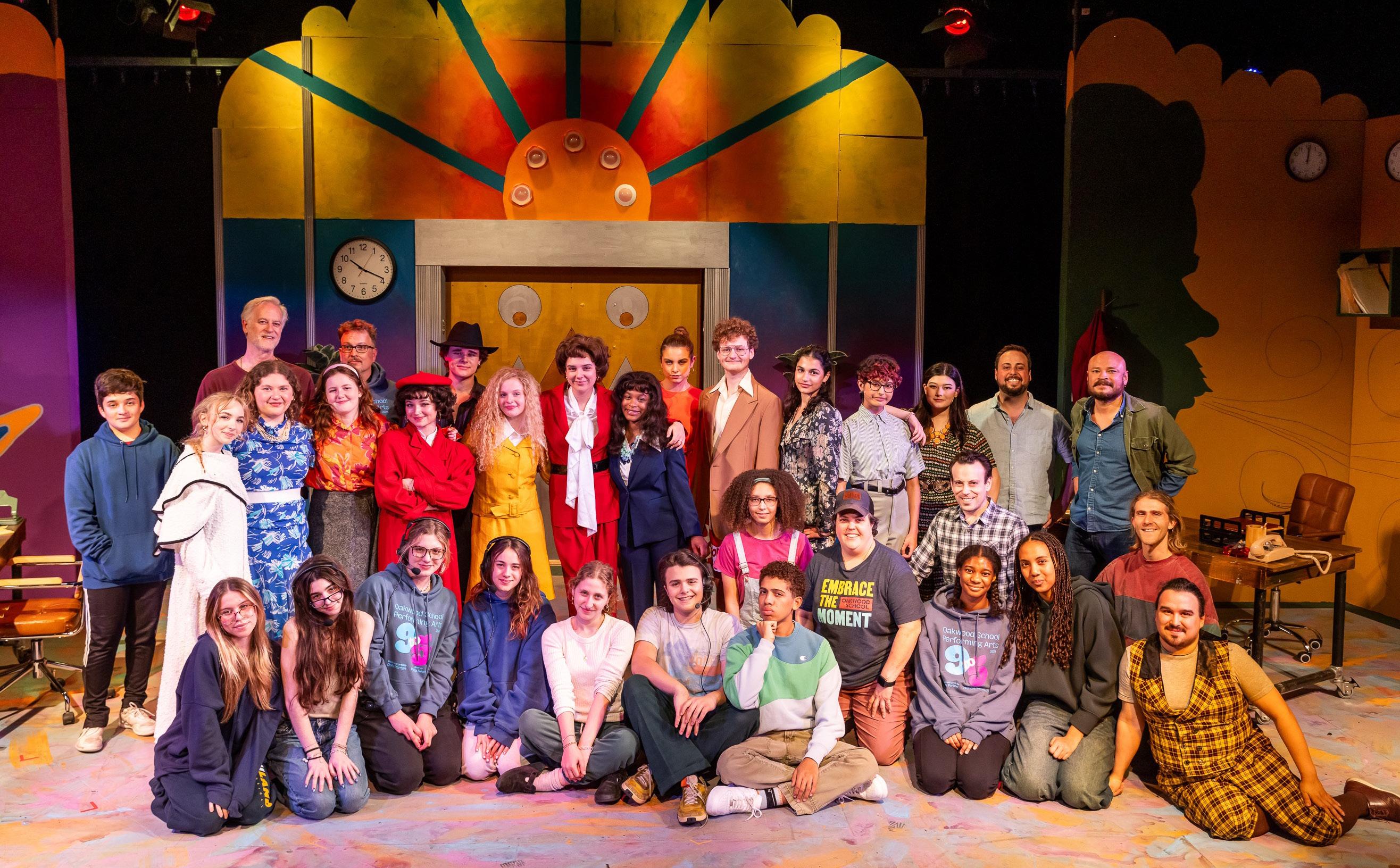

MUSIC THEORY
Grades Nine through Twelve
STRING ENSEMBLE
Grades Seven through Twelve
MUSIC THEORY WITH COMPOSITION
Grades Nine through Twelve
JAZZ THEORY AND IMPROVISATION LEVEL 1
Grades Nine and Ten
JAZZ THEORY AND IMPROVISATION LEVEL 2
Grades Eleven and Twelve
BIG BAND
Grades Nine through Twelve
NEW MUSIC ENSEMBLE
Grades Nine through Twelve
JAZZ COMBOS
Grades Nine through Twelve
CHORALIERS
Grades Nine through Twelve
ADVANCED STUDIES MUSIC HISTORY & ANALYSIS *
Grades Ten through Twelve
ADVANCED STUDIES MUSIC COMPOSITION & ANALYSIS *
Grades Ten through Twelve
THEATRE ARTS
INTRODUCTION TO PERFORMING ARTS
Grade Seven
MIDDLE SCHOOL MUSICAL
Grade Seven and Eight
MIDDLE SCHOOL MUSICAL THEATRE WORKSHOP
Grade Eight
HIGH SCHOOL MUSICAL THEATRE WORKSHOP
Grades Nine through Twelve
INTRODUCTION TO THEATRE TECH
Grade Eight
MIDDLE SCHOOL PLAY PRODUCTION
Grade Eight
DRAMA I: INTRODUCTION TO ACTING
Grades Nine and Ten
STAGECRAFT
Grades Nine through Twelve
DRAMA II: CONTEMPORARY SCENE STUDY
Grades Ten through Twelve
INTRODUCTION TO IMPROV
Grades Nine through Twelve
THEATRE STYLES AND GENRES
Grades Eleven and Twelve
ADVANCED SCENE STUDY: STANISLAVSKI
Grade Twelve
ADVANCED STUDIES TECHNICAL THEATRE *
Grades Eleven and Twelve
ADVANCED SCENE STUDY: SHAKESPEARE
Grade Twelve
INTERNATIONAL THESPIAN SOCIETY
Grades Ten through Twelve
ALL SCHOOL PLAY/ ALL SCHOOL MUSICAL
Grades Nine through Twelve
THEATRE COSTUME DESIGN & CONSTRUCTION
Grades Nine through Twelve
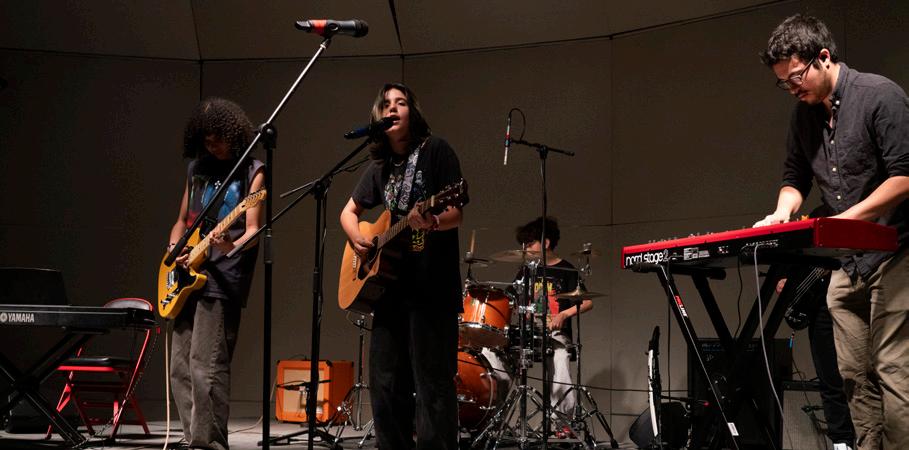
The Visual Arts curriculum is designed to help students gain knowledge and experience with the languages of the visual world. We stress art as a form of communication within a cultural and historical context. Students learn technical skills with which to express themselves, as well as vocabulary to discuss their vision and the vision of others. We strive to introduce our students to a lifelong appreciation of art as a means of personal and cultural representation.
All seventh graders are required to sign up for at least one Introduction to Art class.
INTRODUCTION TO ART
INTRODUCTION TO ART: DRAWING & MIXED
PRACTICES Grades Seven and Eight
INTRODUCTION TO ART: PRINCIPLES OF DESIGN Grades Seven and Eight
CERAMICS I Grades Nine through Twelve
CERAMICS II Grades Ten through Twelve
CERAMICS III Grades Eleven and Twelve
CERAMICS IV Grade Twelve

ART & DESIGN Grades Nine through Twelve
DRAWING/PAINTING
DRAWING I Grades Nine through Twelve
DRAWING AND PAINTING II
Grades Ten through Twelve
DRAWING AND PAINTING III
Grades Eleven and Twelve
DRAWING AND PAINTING IV Grade Twelve
FILM AND VIDEO
INTRODUCTION TO FILM AND VIDEO
Grade Eight
FILM AND VIDEO I
Grades Nine through Twelve
FILM AND VIDEO II
Grades Ten through Twelve
FILM AND VIDEO III
Grades Eleven and Twelve
FILM AND VIDEO IV Grade Twelve
INTRODUCTION TO PHOTOGRAPHY
Grade Eight
PHOTOGRAPHY I
Grades Nine through Twelve
PHOTOGRAPHY II
Grades Ten through Twelve
PHOTOGRAPHY III Grades Eleven and Twelve
PHOTOGRAPHY IV Grade Twelve
SCULPTURE
INTRODUCTION TO SCULPTURE
Grade Eight
SCULPTURE I Grades Nine through Twelve
SCULPTURE II Grades Ten through Twelve
SCULPTURE III Grades Eleven and Twelve
SCULPTURE IV Grade Twelve
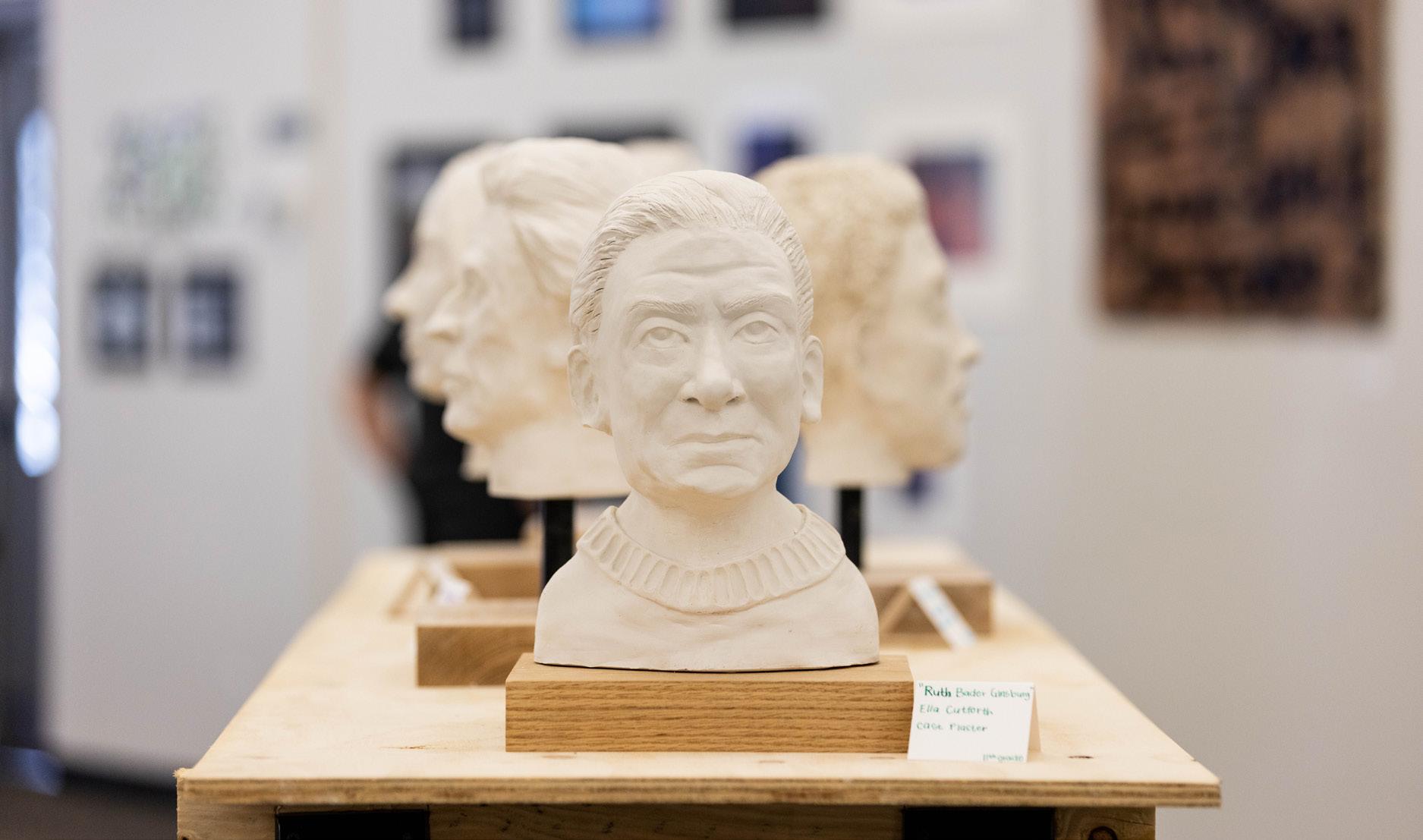
INDEPENDENT STUDY (Grades Eleven and Twelve)
Independent Study offers the opportunity for indepth study of particular topics that are not offered in the regular curriculum. Students are expected to do at least as much work as they do in conventional courses and to meet with the teacher twice each week. A regular program of assessments is required as well as a culminating portfolio or project for successful completion. Students who wish to pur-
sue independent study must recruit a faculty sponsor, devise a curriculum, and obtain the approval of the department chair, the student's advisor, the high school dean and the academic dean. Independent study courses for a given school year should be designed and approved during the course sign-up process in April of the preceding school year.
ARTS
Dance History
Introduction to
Documentary Films
Playwriting
Recording and Engineering
Serial Photography
COMPUTER SCIENCE AND STEAM.
Architecture & Design
Digital Sound Technology
Electric Vehicles
Java Programming
ENGLISH
Modern Poetry
Russian Literature
Shakespeare
Writers of the Beat Generation
MATHEMATICS
Differential Equations
Linear Algebra
Microeconomics
Multivariable Calculus
SCIENCE
Applied Physics
Biochemistry in the Lab
Cognitive Science
Organic Chemistry
SOCIAL STUDIES
Film Theory & History
Immigration & Farm Work
Social Philosophy
Structuralism &
Post-Structuralism
The Modern Middle East
WORLD LANGUAGES
Traveler’s French
Hispanic Culture & History
American Sign Language
SPECIAL TOPICS (Grades Ten through Twelve)
These enrichment courses allow students to pursue special interests without the rigor of a full independent study course. Transcript credit is assigned on a pass/fail basis only. Students must find a teacher or mentor, submit a course plan, arrange weekly meetings, and present a culminating project or hold a
final conversation with the teacher and department chair. Students wishing to set up a Special Topics class for a semester may do so during the first drop/ add date deadline for each term (usually about two weeks after the start of the term).
ARTS
Conducting
Songwriting
Drafting
The Meisner Technique
Directing
Furniture Design
Women in Film Pattern and Silk Screen
ENGLISH
Jane Austen
Novel Writing
Modern Absurdism
Dystopian Fiction
David Foster Wallace
MATHEMATICS
Modern Cryptography
Game Theory
Advanced Problem Solving
Sabermetrics
SCIENCE
Computational Physics
Quantum Mechanics
Solar Army: Chemical Innovation
Metabolic Disease
SOCIAL STUDIES
History of Comics
Proletarian Literature
Existentialism
Educational Systems
American Economics Since the 1970s
Psychology of Autoimmune Diseases
WORLD LANGUAGES
Conversational French
The Athletics program at Oakwood complements the school’s rigorous and innovative college preparatory program by offering a wide variety of competitive team sports, providing students the opportunity to develop mind, body and character for themselves, their team and their school. At the center of the Athletic program is the belief that success is not just measured by the scoreboard, but by 1) being your best 2) accepting responsibility and 3) putting the team first.
As a member of the San Fernando Valley Private School Athletic League, Oakwood students compete against schools such as Buckley, Campbell Hall, Harvard-Westlake, Viewpoint, Berkeley Hall, and ten other schools.
MIDDLE SCHOOL SPORTS
Fall
Boys Cross Country
Flag Football
Fencing
Girls Cross
Country
Girls Tennis
Girls Volleyball
Winter Boys Basketball
Boys Soccer
Fencing
Girls Basketball
Girls Soccer
Spring Baseball
Boys Tennis
Boys Track & Field
Boys Volleyball
Fencing
Girls Track & Field
Softball
The middle school provides all students with the opportunity to participate, build their skills, learn sportsmanship and be a productive team member, though participation is contingent upon tryouts.
The high school provides the opportunity for students to stretch themselves to compete at the highest level appropriate to their abilities.
The Athletic Department is led by Steve Smith, WNBA coach. He oversees a highly skilled coaching staff, most of whom played Division I athletics in college and beyond.
As a member of the Liberty League, Oakwood Athletes compete against schools such as Buckley and Milken and will play non-league contests against schools such as Brentwood, Viewpoint, Campbell Hall, and Pasadena Polytechnic.
HIGH SCHOOL SPORTS
Fall
Boys Cross Country
Fencing
Flag Football
Girls Cross
Country
Girls Tennis
Girls Volleyball
Winter
Boys Basketball
Boys Soccer
Fencing
Girls Basketball
Girls Soccer
Spring Baseball
Boys Tennis
Boys Track & Field
Boys Volleyball
Fencing
Girls Track & Field
Softball
Swimming
Over the past year, all high school varsity sports Oakwood teams advanced to the CIF-SS playoff and 34 players received allleague recognition. Under the leadership of Steve Smith, over 20 graduating athletes have gone on to compete in college.
2018 CIFSS CHAMPIONS: GIRLS BASKETBALL
2019 CIFSS CHAMPIONS: GIRLS VOLLEYBALL
2020 CIFSS FINALIST: BOYS SOCCER, BOYS
BASKETBALL, GOLF—INDIVIDUAL
2022 CIFSS CHAMPION: BOYS SWIMMING
2023 LEAGUE CHAMPIONSHIPS: BOYS BASKETBALL, GIRLS BASKETBALL, TRACK & FIELD, GIRLS SOCCER, SWIMMING
2023 CIF-SS FINALISTS: BOYS BASKETBALL, GIRLS BASKETBALL
2023 CIF-SS CHAMPIONSHIPS: SWIMMING 200 M & 500 M FREESTYLE
The goal of the Physical Education Department at Oakwood is to empower students to make healthy lifelong choices that support their well-being by providing the information and instruction necessary for them to make good decisions now and in the future. Physical education classes take place twice a week and offer a wide range of lifetime activities such as badminton, weightlifting, Ultimate Frisbee, and yoga. High school students may elect to enroll in a dance course to fulfill the P.E. requirement.
• Understand the interconnectedness of the body and the mind.
• Understand the positive and negative effects of what you put in your body and how they influence whole health.
• Understand the physical, emotional, and social changes of being a teenager.
• Have specific physical activities and a wide variety of exercises they can participate in throughout their lives.
• Be able to set future goals, and implement a lifelong commitment to wellness.
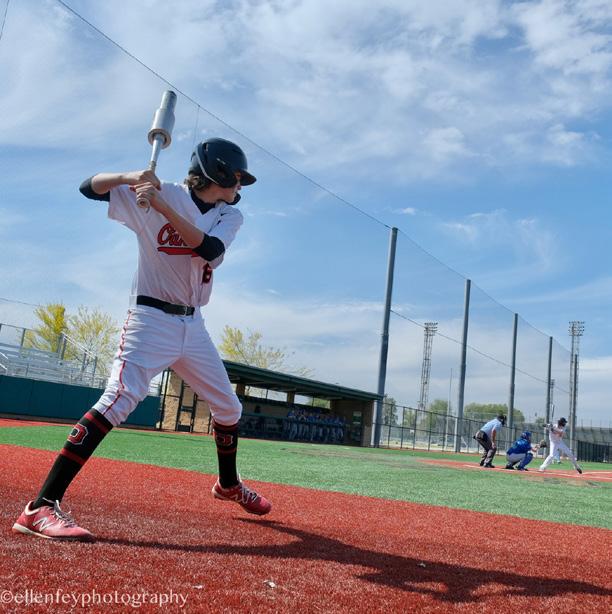
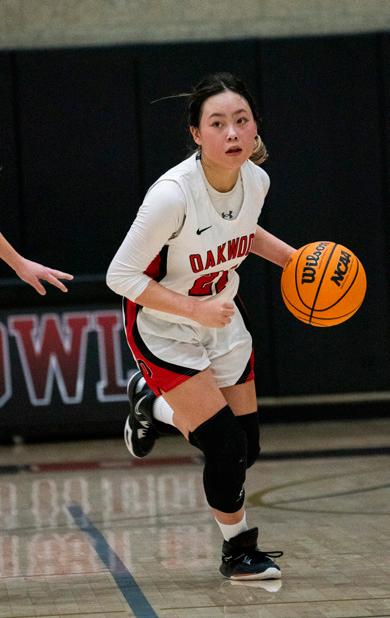
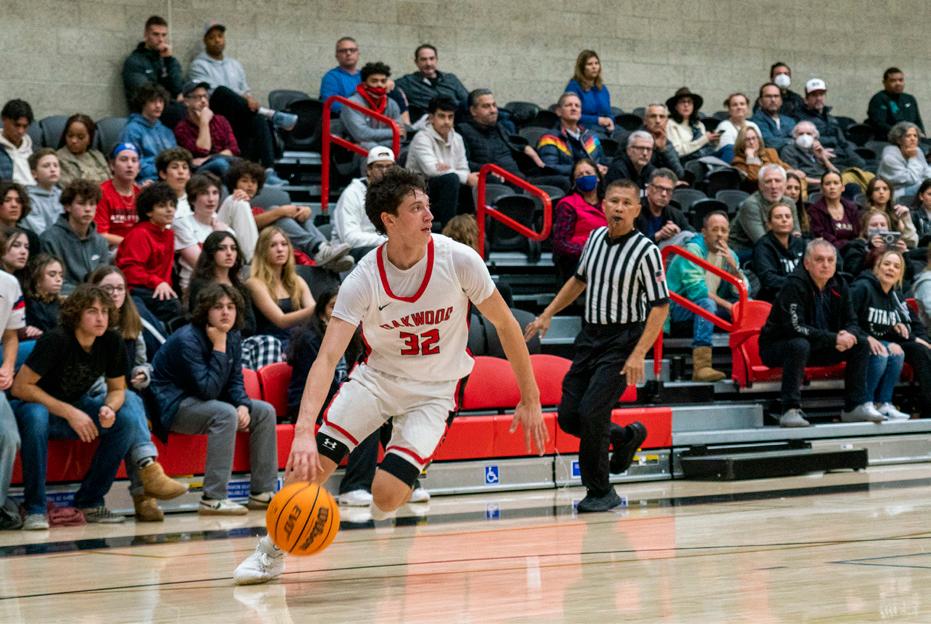
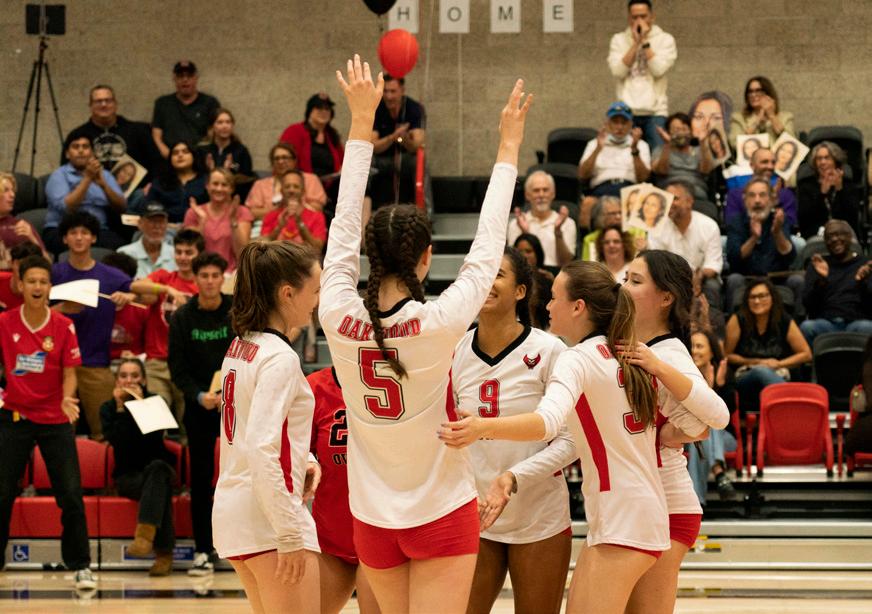
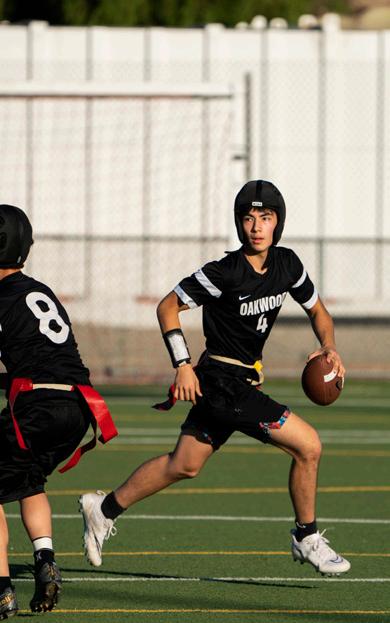


Middle School Enrichment
All 7th and 8th grade students take an additional elective every Wednesday beyond the array of required courses. Many of the courses revolve around social justice and visual and performing arts and are taught by graduate students from CalArts or Oakwood faculty.
• Aztec Dungeons and Dragons
• Coding and Robotics
• Computer Animation
• Fashion Design
• Focusing on Feminism
• Living in Los Angeles: Then and Now
• Guitar Making
• Songwriting and Recording
• Speak Up: Creative Writing and Current Events
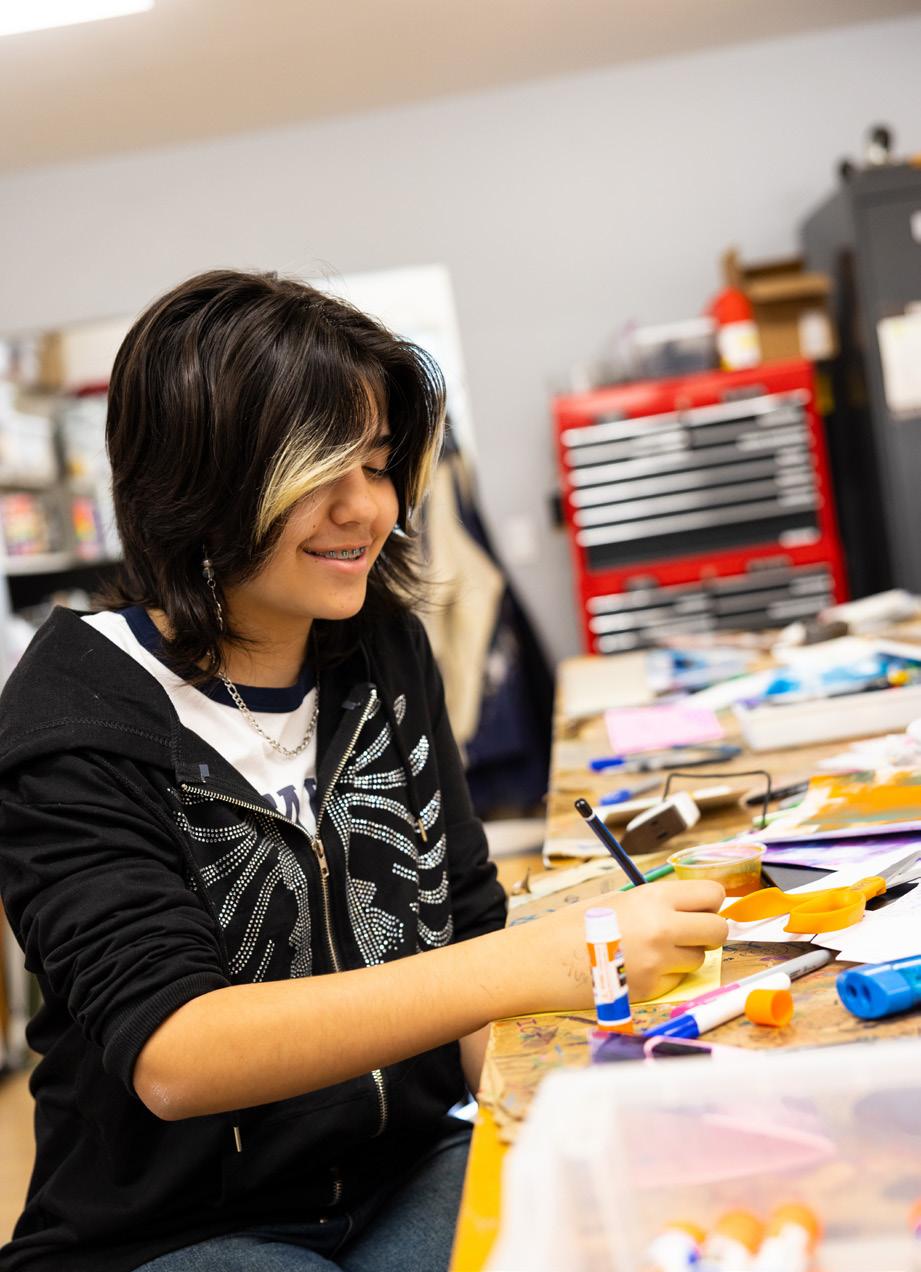
Mentorship Program
For high school students who wish to pursue advanced study in a particular artistic discipline, a mentorship provides one-on-one contact with a CalArts graduate or graduate student with proficiency in that field. These usually take place during a student’s frees or after school and past mentorships have included jazz piano, landscape painting, acting lessons, among many.
ENRICHMENT OFFERINGS PER SEMESTER
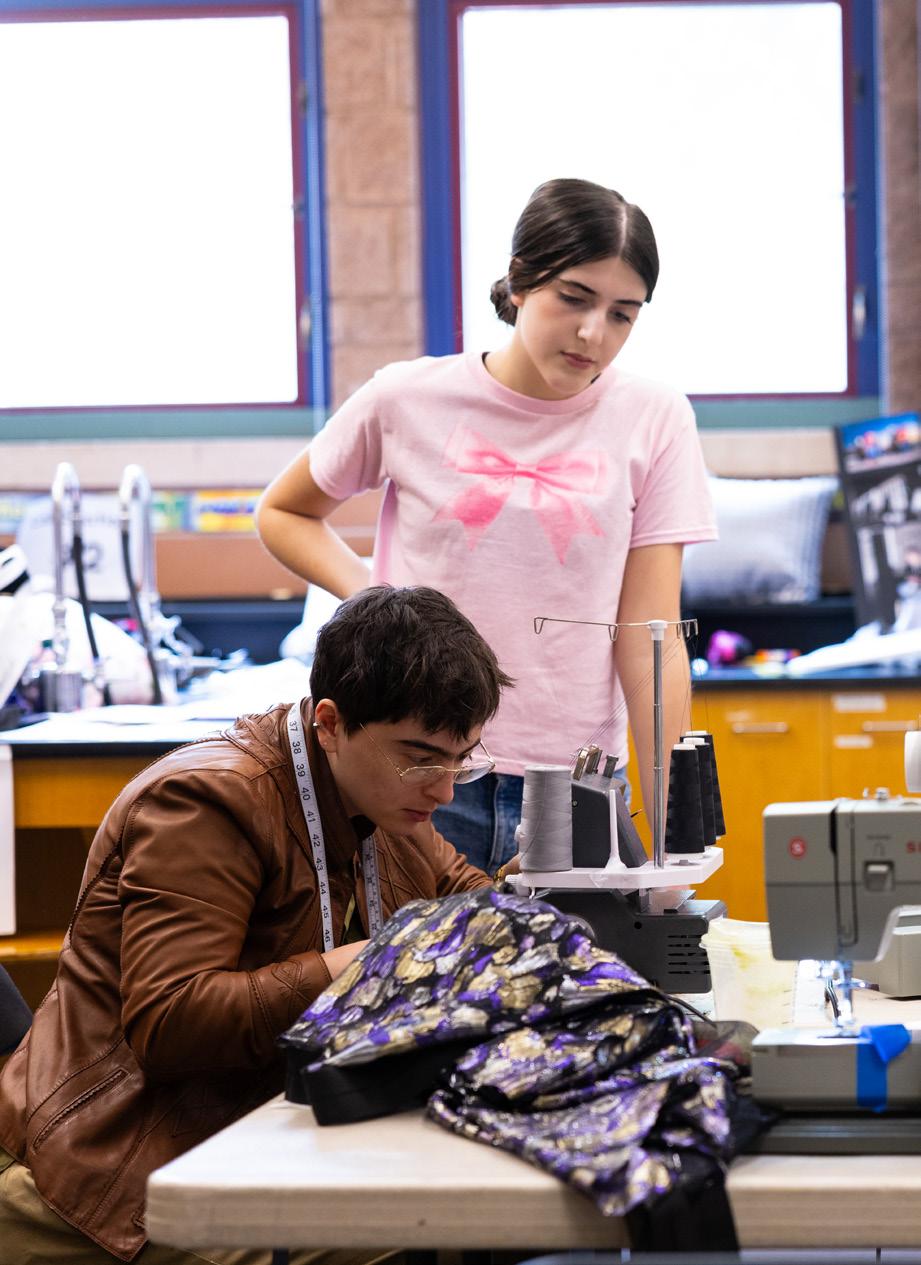
Student Publications
• The Parliament, High School Newspaper
• The Hoot, Middle School Newspaper
• Pan Paniscus, Art and Literary Magazine
• Yearbook
Human Development (Grades Seventh through Tenth)
The Human Development course is intended to provide students with knowledge and skills for healthy attitudes towards aspects of adolescent growth and development, including mental, physical and sexual health and wellness. Our class discussions and activities encourage students to be advocates for themselves and others, and engage in responsible decision-making in matters relating to their personal health and the health of those around them.
Student Council
Two elected representatives from each grade as well as four general officers serve on the Oakwood Student Council. They serve as the primary representative body of Oakwood students and coordinate school-wide events, such as dances, fundraisers, school-wide lunches and other social events. In addition, they collaborate with the Student Store, moderate Town Meetings, and advise the administration on policies that affect student life.
7th Grade Seminar
7th Grade Seminar guides students toward a deeper awareness of how they view the world and how that view has been developing over the years. Students will then explore the concept of difference in order to gain knowledge of various perspectives and foster positive attitudes toward difference. In addition to building awareness, knowledge, and understanding, students will learn and practice communication skills that will help them clearly express their ideas
and interact with others in ways that build positive connections.
This course is specifically designed to equip students with practical strategies, including lateral reading and reverse image searching, all while fostering a sense of healthy skepticism.
8th Grade Community Leadership
Community Leadership is where students build the skills and experiences necessary to continue to grow in the civic engagement. Additionally, students will learn the five stages of Service Learning and how to apply them to different social, cultural, and economic issues in their community.
Afterschool Performing Arts Opportunities
• Middle School Play
• Middle School Musical
• High School Play
• High School Musical
• Spirit Squad/Hip-Hop
• Stage Craft
• Costume Design
• Songwriting
• Glee/Choraliers
• Rock Bands
• Jazz Bands
• Music Production
• Improv
Examples of recent Oakwood productions include: Rent, 9 to 5, Beetlejuice, Pippin, Dracula, The Colored Museum, Chicago, and Into the Woods.
Afterschool Middle School Debate
Middle School Debate meets afterschool three times a week (full-year commitment) with multiple weekend debate tournaments. This course reviews the basics and introduce advanced forms of argumentation including topicality, counterplans, disadvantages, weighing mechanisms and frameworks.
High School Debate meets twice a week. Multiple weekend-long tournaments across the country and frequent travel are required. High School Debate emphasizes “Public Form” and traditional “Lincoln Douglas” debate styles. Students build a foundation for effective argumentation and advocacy (claim/ warrant/evidence) by participating in practices and multiple weekend-long national circuit competitions. This program is aimed for students who are interested in analytical research and case-building as well as forming competitive partnerships. Debaters often contribute significant time and energy into the extracurricular activity.
Additional Student Led Clubs
• Arts Fair Committee
• Chess
• Culinary Club
• Environmental Justice at Oakwood
• EntrepreneurshipClub
• ESports
• Film Club
• Global Nomads
• International Thespian Honors Society
• Jewerly Making Club
• KOAK Radio Station
• Mock Trial
• Model U.N.
• Mural Club
• Peer Tutoring
• Political Philosophy
• Prom Committee
• Sound Crew
• Spirit Squad
• Swiftie Club, and much more.
Students may propose and create additional clubs with a faculty/staff member.
Advisors serve as a caring guide and support through the academic, social, and emotional landscape of school life. Secondary campus students meet in Advisory twice per week in groups of 12.
Each week, the entire Oakwood secondary campus community gathers together in the gym for nearly an hour. Led by the elected co-presidents of Student Council, Town Meeting is at once forum, performance, gathering, exhibition and information session. Musical performances, club meeting announcements, spoken word op-ed pieces, dramatic readings, dance offs, shout outs, green living tips, and celebrations showcase the diversity, creativity and freedom of expression at the core of the Oakwood spirit. It is one vibrant manifestation of the Statement of Philosophy and of the passions that compose the Oakwood community.
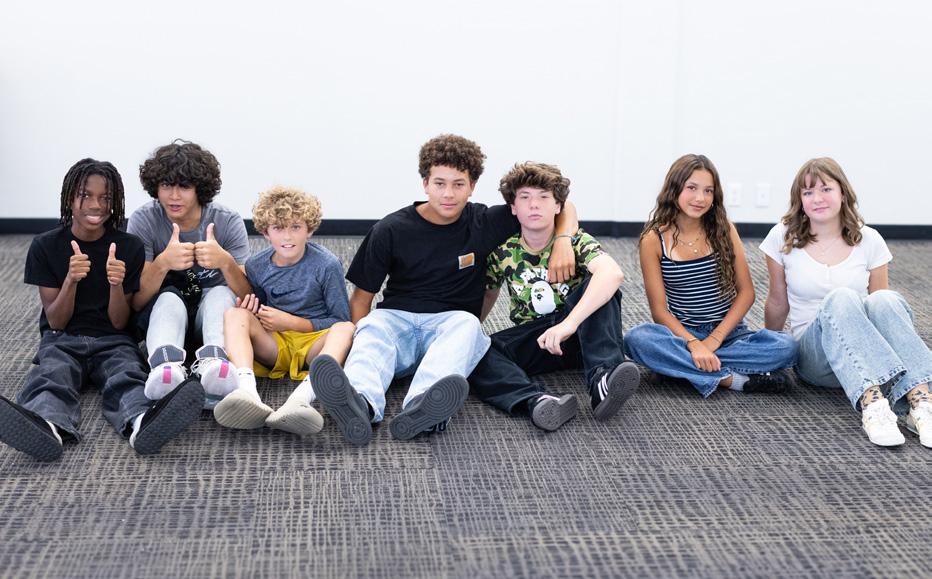

At Oakwood, we endeavor to thoughtfully integrate technology into our curriculum in ways that are meaningful and enriching to our students’ experiences. We also recognize the critical role digital technology plays in preparing our students to engage in the 21st century world:
• Enhancing independence and self-initiated learning among students.
• Allowing students creative ways to demonstrate their understanding.
• Facilitating communication between students and teachers.
• Providing opportunities for collaboration.
• Supporting differentiation in learning.
In order to maximize the benefits of integrated technology, we have implemented what is known as a “bring your own laptop” program. This versatile approach aims to accomplish the following goals:
• Allow students to develop a comfort and competence with their own device.
• Ensure continuity for work at home and in the classroom environment.
• Increase the efficiency and innovation with which teachers can guide students in their use of digital tools.
Additionally, the results of our initial family surveys showed that 90% of families already own a device that meets the required specifications. Thus, for many families, this program does not necessarily require the purchase of a new device.
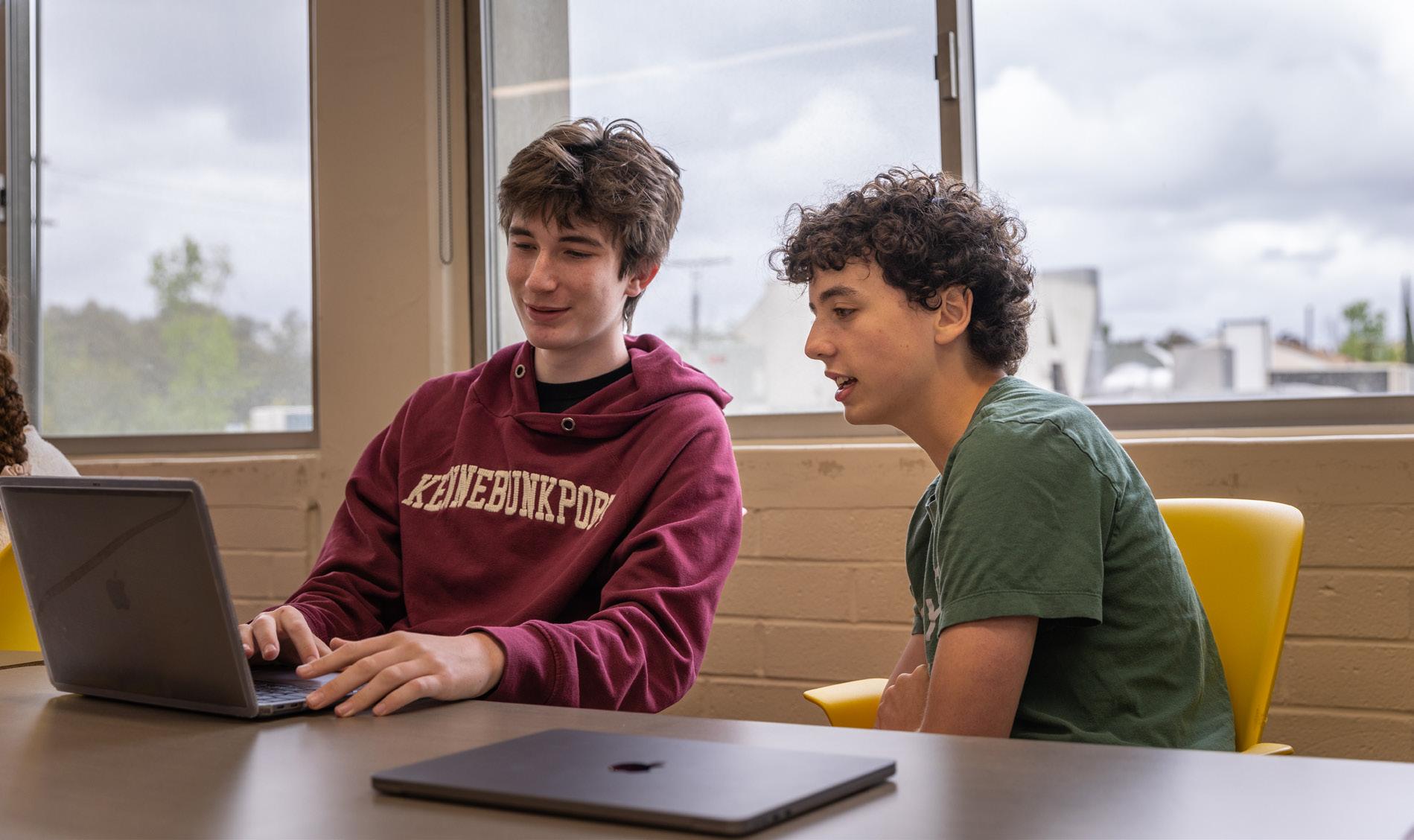
While Oakwood graduates are accepted to the same colleges as other independent schools you may be considering, we don’t think of college acceptances as the end goal. We believe in the intrinsic value of the Oakwood experience and the habits of mind that it instills–teaching students to be lifelong learners and powerful self-advocates. Being accepted to college is certainly important, but what our students can make of their college experience as a result of their time at Oakwood is paramount. When it comes to choosing a college, we are deeply concerned with fit. We are all about helping our students explore that huge map of possibilities and coming up with a cohesive set of options that will meet their academic, social, and financial needs.
OVER THE PAST FOUR YEARS, OAKWOOD
ENROLLED
Allegheny College
American University
Arizona State University (Tempe)
Bard College
Barnard College
Berklee College of Music
Boston College
Boston University
Bowdoin College
Brandeis University
Brown University
California Polytechnic State University (San Luis Obispo)
California State University (Northridge)
Carleton College
Carnegie Mellon University
Chapman University
Colby College
Colgate University
Colorado College
Columbia College (Chicago)
Columbia University
Connecticut College
Davidson College
DePaul University
Drexel University
Duke University
Emerson College
Emory University
Eugene Lang College of Liberal Arts at The New School
Fordham University
George Washington University
Georgia Institute of Technology
Grinnell College
Hampton University
Harvard University
Haverford College
Howard University
Indiana University (Bloomington)
Kenyon College
Lafayette College
Lewis & Clark College
Loyola Marymount University
Macalester College
Massachusetts Institute of Technology
Middlebury College
Monmouth University
Mount Holyoke College
Mount Saint Mary’s University
Musicians Institute
New York University
Northeastern University
Northwestern University
Oberlin College
Occidental College
Pace University (New York City)
Parsons School of Design at The New School
Pitzer College
Pomona College
Pratt Institute
Reed College
Rensselaer Polytechnic Institute
Rhode Island School of Design
Richmond American University London
Saint Mary’s College of California
Santa Monica College
Sarah Lawrence College
Savannah College of Art and Design
School of Visual Arts
Scripps College
Skidmore College
Smith College
Southern Methodist University
Southern University and A&M College
Spelman College
Stanford University
Syracuse University
The University of Texas at Austin
Towson University
Tufts University
Tulane University of Louisiana
University College Dublin
University of California (Berkeley)
University of California (Davis)
University of California (Los Angeles)
University of California (Merced)
University of California (Riverside)
University of California (Santa Barbara)
University of California (Santa Cruz)
University of Chicago
University of Colorado Boulder
University of Denver
University of Miami
University of Michigan
University of Nevada (Las Vegas)
University of North Carolina at Chapel Hill
University of North Carolina School of the Arts
University of Oregon
University of Pennsylvania
University of Puget Sound
University of Redlands
University of Rochester
University of San Francisco
University of Southern California
University of St Andrews
University of Washington (Seattle Campus)
University of Wisconsin (Madison)
Vassar College
Virginia Commonwealth University
Washington University in St. Louis
Wesleyan University
Wheaton College - MA
Whitman College
Williams College
Worcester Polytechnic Institute
Yale University
Oakwood School is committed to reducing our impact on both the environment and our neighbors. We therefore encourage families to take advantage of our bus service to help us achieve these goals.
We are offering three bus routes for the school year serving Hancock Park/Beverly Hills, The West Valley, Pasadena/Glendale/Los Feliz, and Culver City. Riders have the option of registering for one-way or round-trip routes, with unlimited rides
per week. We also offer day passes, based on availability. Financial assistance is available for qualifying families.
All buses are equipped with GPS, which allows parents to track their child's bus in real time through an app called SafeStop.
In addition, Oakwood is conveniently located by the 170 freeway and the orange & red Metro lines.



